Schools on a mission

CREATING PATHWAYS TO GREATER DEI

Khaleel and Rimi Shreet pay it forward at Southern New Hampshire University, which helped them obtain education and employment. See page 20.
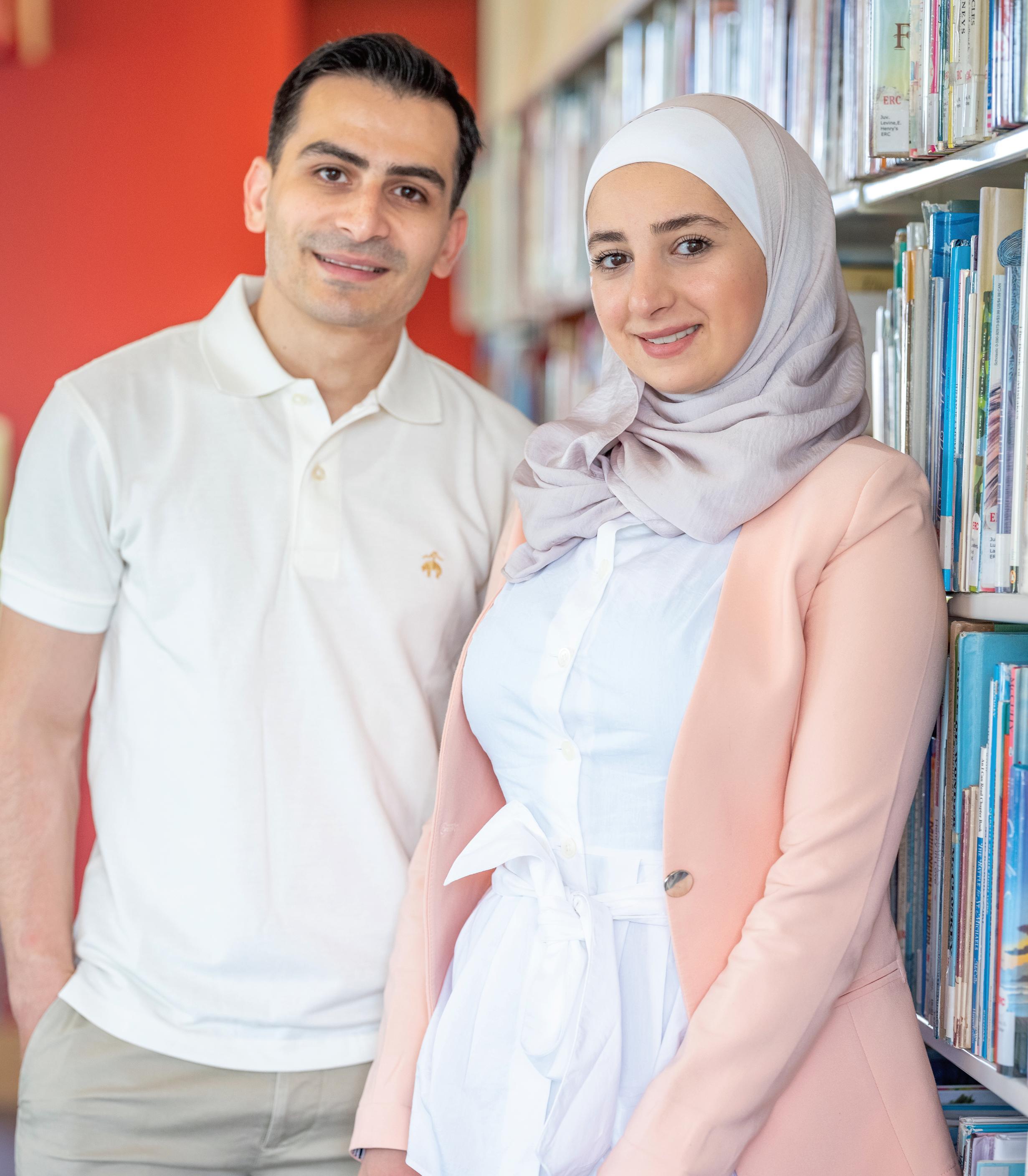
AFGHAN FAMILY EMBRACES NEW LIFE IN QUEEN CITY NH GAY MEN’S CHORUS MARKS 25 YEARS DELIGHT YOUR PALATE AT NH’S ETHNIC MARKETS Q3 2023
(Robert Ortiz Photo)
The Equity Leaders Fellowship (ELF) is a program that was developed by leaders of color for leaders of color in New Hampshire. We grow the pipeline of leaders from communities of color to take leadership positions on community committees, boards of directors, and other state & local civic engagement opportunities.

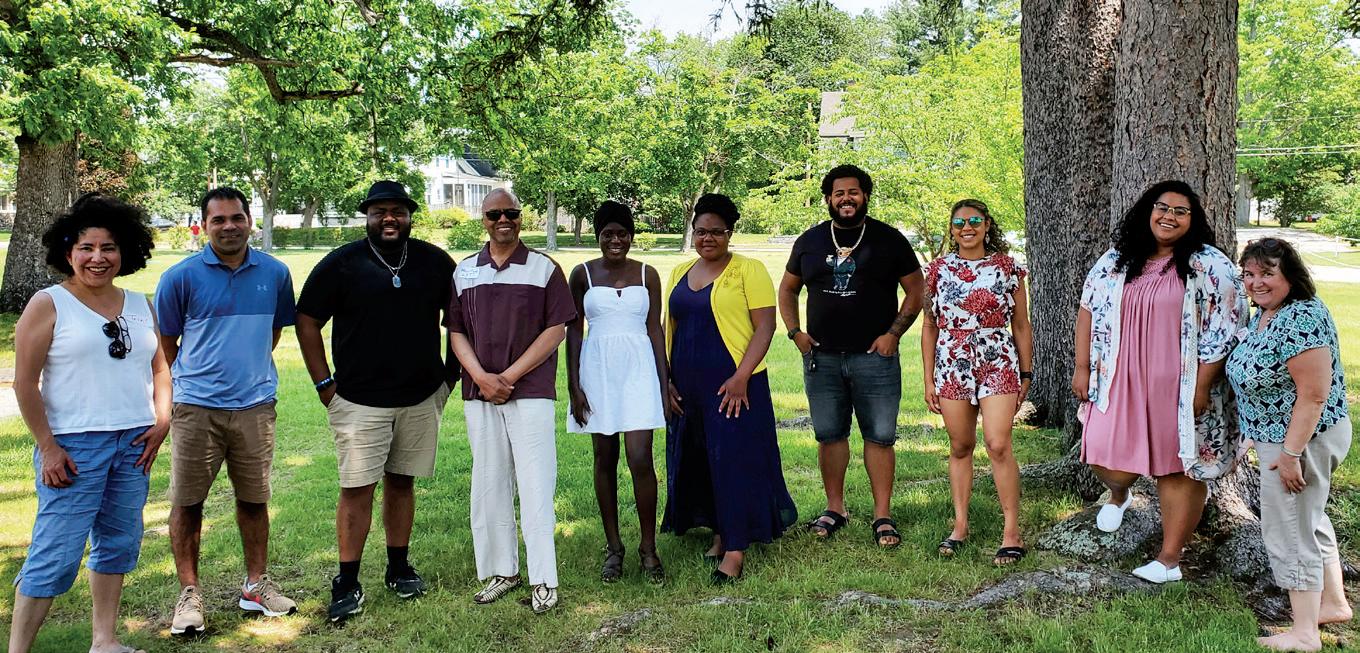


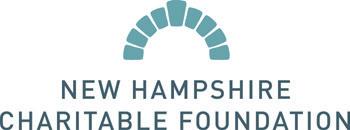
ELF creates a supportive environment to grow the relationship networks of leaders of color. Joining the ELF “family” results in new relationships, increased social capital, and a community of peer support in the growing networks of fellows/alumni, mentors, community leaders, and faculty, as well as board champions. The overall goal of ELF is dual: to build a deep understanding of equity and capacity for collective impact around priority issues for communities of color, and; to build a network of engaged fellows/alumni, mentors, community advisors, and faculty with strong personal and professional relationships.
Currently accepting applications for our 10th Anniversary cohort . Apply at https://www.snhahec.org/elf-fellow-application.html
The New Hampshire Charitable Foundation is proud to underwrite 603 Diversity and to devote this advertising space to promote nonprofit organizations working to advance diversity, equity, inclusion and belonging in New Hampshire.
FROM THE PUBLISHER
UNIQUE VOICES, UNIVERSAL truths
Music has played a central role in my life since childhood. At one point, I thought I would make my career in it; as a performer, a teacher or more likely, a combination of both. I loved the almost meditative nature of performance – when it’s going well, in a flow state, the performer is purely in the moment.
For someone who often struggles to quiet racing, torrents of thought, this is bliss. I also loved music for the stories it told. I inhabited them when I sang or played them, just as intimately as one inhabits a character and a world, in a well-written novel.
Eventually, my vocational path led through my other passion: written words. Music remained my avocation though, and there’s never been an era in my adult life when picking up a guitar or sitting down at the piano hasn’t been my first instinct when it’s time to celebrate or to grieve.

These days I primarily play solo acoustic shows in bars and restaurants a couple of times a month. While I write songs, I mostly play covers at these gigs. I love the look on people’s faces when they recognize the opening riff, the delight they have at knowing all the words and being able to sing along.
A well-written song feels like it contains a universe and could be unpacked by new performers forever and never be emptied of its meaning. There’s a long tradition in jazz of covering standards. A performer uses their own voice and point of view to find the universal story the song is telling, even though the writer was composing from a unique point of view, set of circumstances, and soul.
This is one of the great, beautiful paradoxes of art: Even as the composer or novelist works to describe the specific set
of experiences that have driven them to create the work, that creation ultimately says something universal about the human experience.
This calls to mind the interesting current public discussion around country star Luke Combs having a number-one song on the country charts with Tracy Chapman’s 1988 hit “Fast Car.” Combs is white. Chapman is Black and queer.
Chapman, a deeply private person, released a statement, telling Billboard, “I never expected to find myself on the country charts, but I’m honored to be there. I’m happy for Luke and his success and grateful that new fans have found and embraced ‘Fast Car.’”
But for some, the fact the first Black woman to hit No. 1 on the Country Airplay chart with sole writing credits did so when a white guy covered the song is indicative of a deeper problem in the industry. It also raises a number of complex questions about culture, and even cultural appropriation, and what that means to different people.
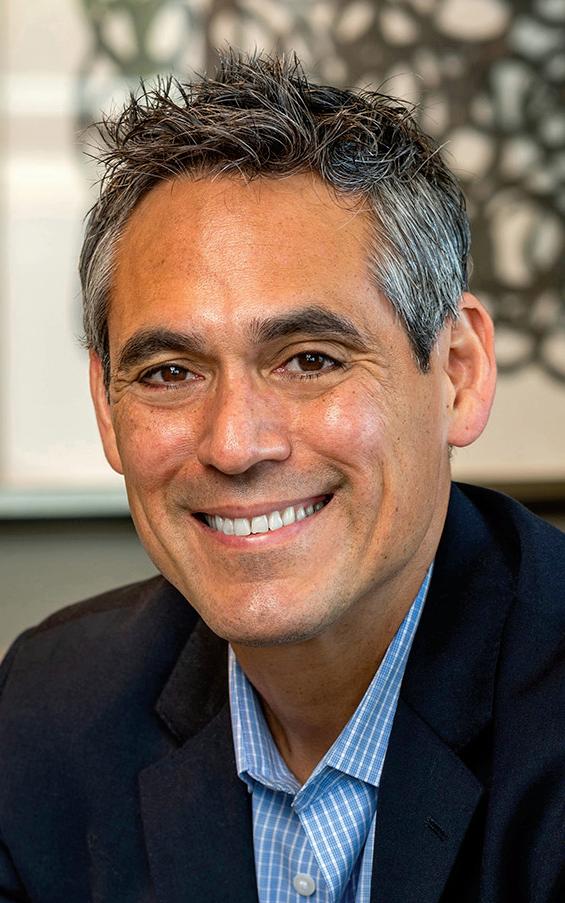
I don’t propose to answer that here or that I even have an answer. But these complex, difficult, perhaps unanswerable questions and the discussions they engender are important to engage in.
And they underscore the power art and story hold in our lives as individuals and in expanding our understanding of each other and the boundaries of our broader social conversations.
That’s one of the reasons we covered a poetry slam in this issue. And why we continue to work to find contributors from among the communities we cover. Each unique voice tells us something true of the world as it is today while simultaneously broadening our idea of what the world could be. 603
603Diversity.com | Autumn 2023 1
FROM PUBLISHER
Contributing Writers
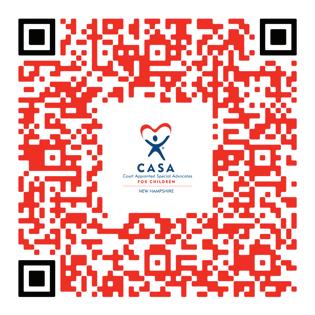
Carolina Valenti
Wildolfo Arvelo
James McKim
Emily Reily
Beth Santos
Tina Kim Philabotte
Contributing Photographer
Robert Ortiz
Contributing Artist
Richard Haynes
Editor/Publisher Ernesto Burden x5117 ernestob@yankeepub.com
Outgoing Managing Editor Rick Broussard
Incoming Managing Editor Mike Cote x5141 editors@603diversity.com
Managing Editor, Custom Publishing Robert Cook x5128 editors@603diversity.com
Creative Services Director Jodie Hall x5122 jodieh@yankeepub.com
Senior Graphic Desinger Nancy Tichanuk x5126 nancyt@yankeepub.com

Senior Production Atistr Nicole Huot x5116 nicoleh@yankeepub.com
Sales Executive John Ryan x5120 johnr@yankeepub.com
Operations Manager Ren Chase x5114 renc@yankeepub.com

Digital Operations and Marketing Manager Morgen Connor x5149 morgenc@yankeepub.com
Billing Specialist/IT Coordinator Gail Bleakley x113 gailb@yankeepub.com
2 603Diversity.com | Autumn 2023
250 Commercial Street, Suite 4014 Manchester,
03101 (603) 624-1442, fax (603) 624-1310 Email: editors@603diversity.com
603DIVERSITY.COM
NH
Advertising: sales@603diversity.com © 2023 Yankee Publishing, Inc. PRINTED IN NEW HAMPSHIRE
NEW HAMPSHIRE GROUP 100% Employee-Owned For children who have experienced abuse or neglect, the voice of one caring adult can make all the difference. Be a CASA volunteer. Scan to sign up for an info session A Child in NH Needs Your Voice


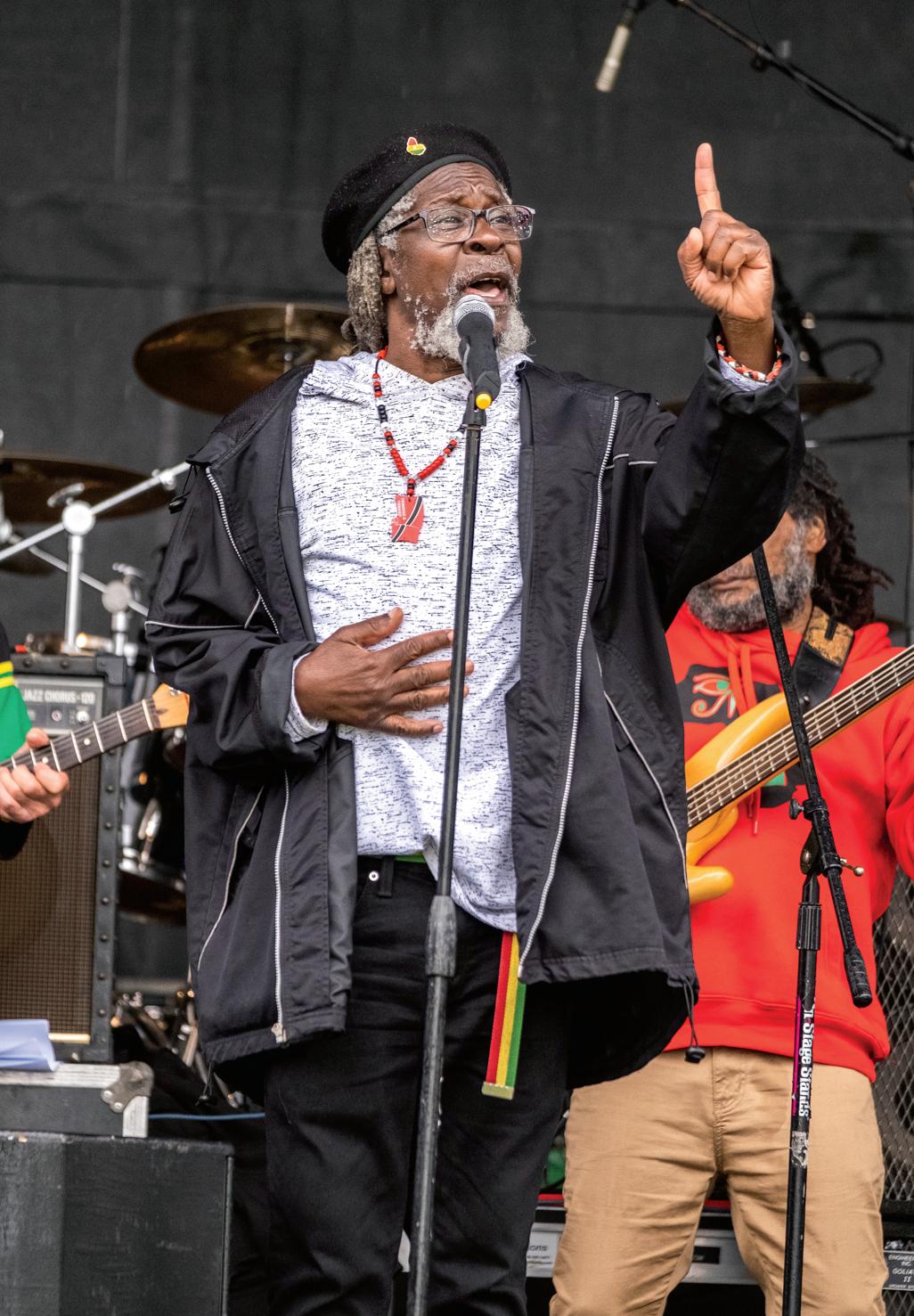


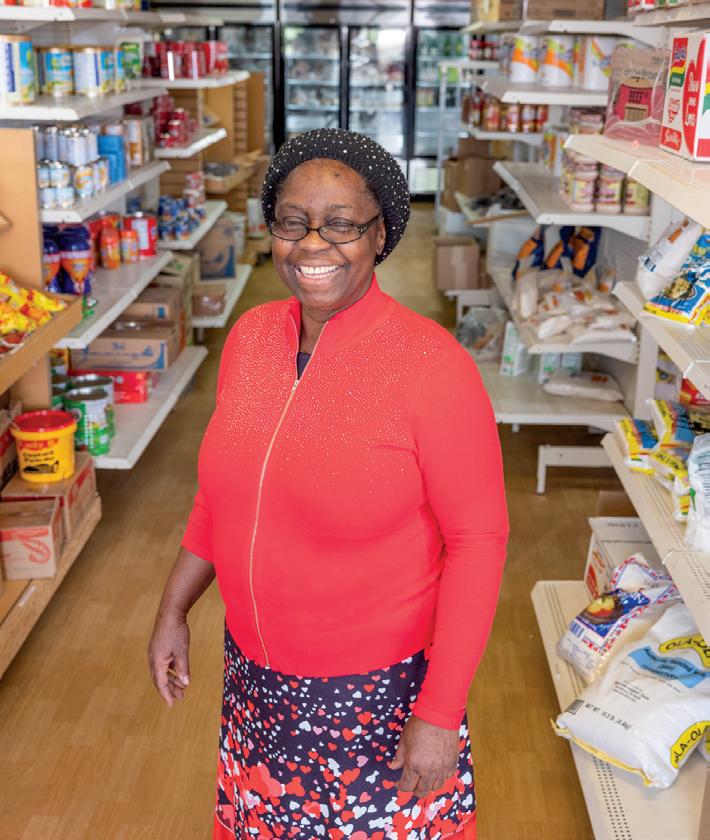
603Diversity.com | Autumn 2023 3 Features Contents UPFRONT & PROFILES 1 From the Publisher 6 Our Contributors 8 Slam Free or Die 10 Profile: Portsmouth’s Joanna Kelly 42 Calendar: Events That Make a Difference 44 Shout Out: NH Gay Men’s Chorus ESSAYS & MORE 28 Diversity News from the Granite State News Collaborative 32 Photo Essay: Juneteenth 2023 34 Essay: K-16 Public Education Must Embrace All Humanity 36 Essay: Attracting a Diverse Population 38 Essay: NH’s Path to an Inclusive Society 20 10 32 8 24 12 New Hampshire’s Ethnic Food Markets 20 From Syria to NH with help from SNHU 22 DEIB at Dartmouth Cancer Center 24 A Place to Call Home 12
A MISSION ON THERise

To illustrate the mission of 603 Diversity, Seacoast artist Richard Haynes has provided one of his recent designs to accompany our motto “Live Free and Rise.” We are selliing T-shirts with Haynes’ design to benefit the Manchester Chapter of the NAACP Visit 603Diversity.com to buy one today.

NEW SHIRT TAKES FLIGHT
Our search for the new “Live Free and Rise” T-shirt design has come to a colorful conclusion. Artist Chloe Paradis will receive a $100 cash prize and the joy of seeing her rainbow-feathered purple finch appear on T-shirts and a variety of other merchandise, promoting the unifying motto of 603 Diversity. Chloe was a student at the Institute of Art & Design of New England College when she created the uplifting new image. (Note: The original “Live Free and Rise” art by Richard Haynes will remain available as an option.) Visit 603Diversity.com to purchase T-shirts and merchandise or to learn more.
UNDERWRITERS ROCK!


The 603 Diversity underwriters provide a significant financial foundation for our mission, enabling us to provide representation to diverse communities and for diverse writers and photographers, ensuring the quality of journalistic storytelling and underwriting BIPOC-owned and other diverse business advertising in the publication at a fraction of the typical cost. We’re grateful for our underwriters’ commitment to diversity, equity and inclusion in this magazine, their businesses and their communities.
THANKS TO THE UNDERWRITERS OF THIS ISSUE FOR THEIR SUPPORT:




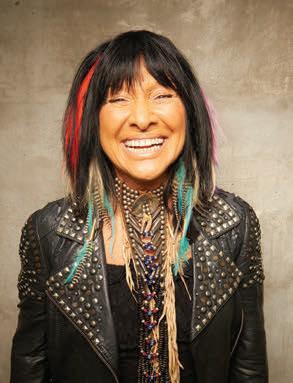





GET YOUR FRONT ROW SEAT WATCH NOW WITH THE FREE PBS APP pbs.org/app Choose a Healthcare Career through convenient, affordable programs from New Hampshire’s Community Colleges! ChooseCommunity.com One-year LPN certificate programs at campuses in Keene, Laconia, Lebanon, Littleton and Manchester Two-year RN programs at all seven campuses NEW
OUR CONTRIBUTORS
Emily Reily
Emily Reily is a freelance journalist and music critic based in Dover whose work has appeared in New Hampshire Union Leader, NH Home Magazine, New York Times for Kids, and Washington Post Magazine. She’s also a former newspaper photojournalist and copy editor.


Beth Santos
Beth Santos has a background in international development, thoughtful community building and social enterprise. She set out to change the landscape of travel for women worldwide by creating the first iteration of Wanderful — a travel blog aimed to explore the diverse and shared experiences of women traveling the world. Today, Wanderful has exploded to an international community and social network with the active participation of over 40,000 women and gender-diverse people of all ages and backgrounds.
James McKim
James McKim, who was involved in the original plannng of 603 Diversity and has written essays for past issues, serves as managing partner of Organizational Ignition. He is driven by an intense need to help organizations achieve their peak performance through the alignment of people, business processes and technology. He is recognized as a thought leader in organizational performance, the uses of neuroscience and program management.
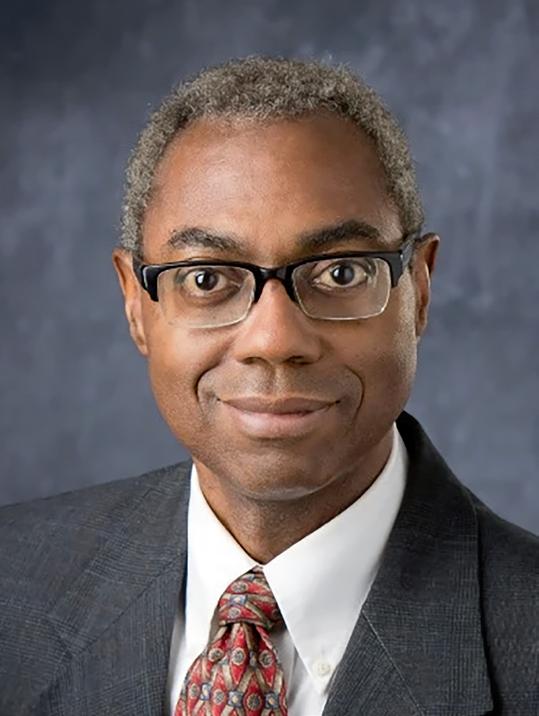
Wildolfo Arvelo, Ed.D.
Dr. Wildolfo Arvelo is executive director of Cross Roads House, the second largest homeless shelter in New Hampshire. Prior to Cross Roads House, Arvelo served as director of the Division of Economic Development for New Hampshire. From 2007-2017, he served as president of Great Bay Community College in Portsmouth. Arvelo has a doctorate in educational leadership from the University of Massachusetts/Boston.
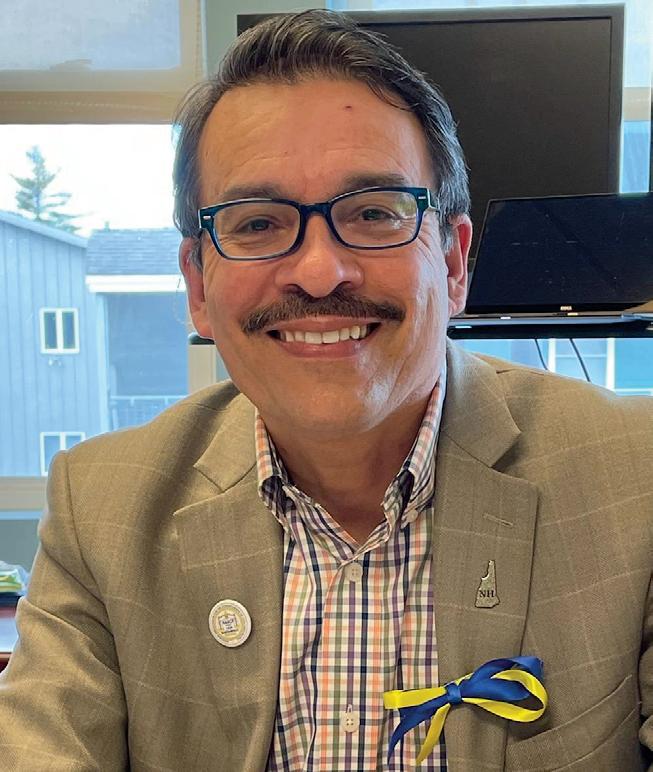
Yasamin Safarzadeh
Our events calendar was compiled by advocate, coordinator and educator Yasamin Safarzadeh, a native Angelino and current resident of Manchester. Safarzadeh hopes to secure a future for a more diverse young adult population in New Hampshire to ensure a more prosperous and effective future for all. DM her at phat_riot on Instagram.

6 603Diversity.com | Autumn 2023
Courtesy photos
Tina Kim Philabotte
Tina Kim Philibotte joined the Manchester School District in July 2021 as the district’s first chief equity officer. She previously spent over 15 years teaching English and Dance at the high school and university levels. Tina recently received NAACP Manchester’s Excellence in Education award as well as the NH MLK Coalition’s Social Justice Warrior award. She was also a 2019 NH State Teacher of the Year finalist and a two-time National Writing Project Fellow. Tina received both her BA and master’s degree in education from Plymouth State University and is currently a doctoral candidate in Boston University’s Educational Leadership & Policy Studies program.
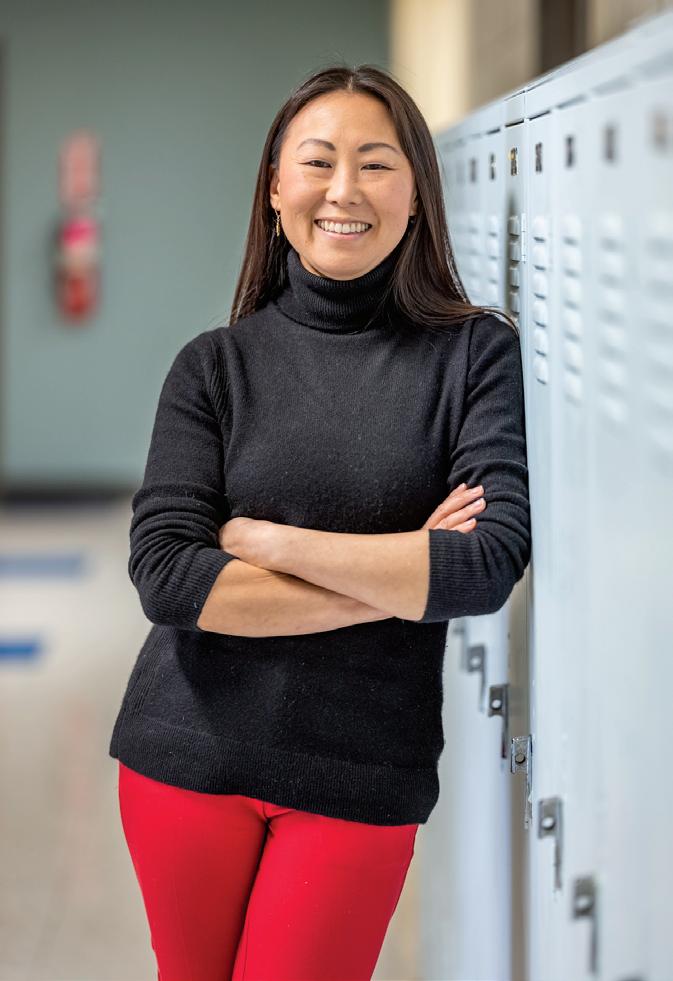
Carolina Valenti
Carolina Valenti, who wrote our feature on New Hampshire’s slam poetry scene, is a Colombian-born writer and finance professional. She has been a contributor for CNBC, CNN, MamásLatinas and El Diario NY, among others, on topics such as political elections, social issues, celebrities and culture. She is also a children’s book author and lives in New Hampshire with her husband, three kids and two dogs.
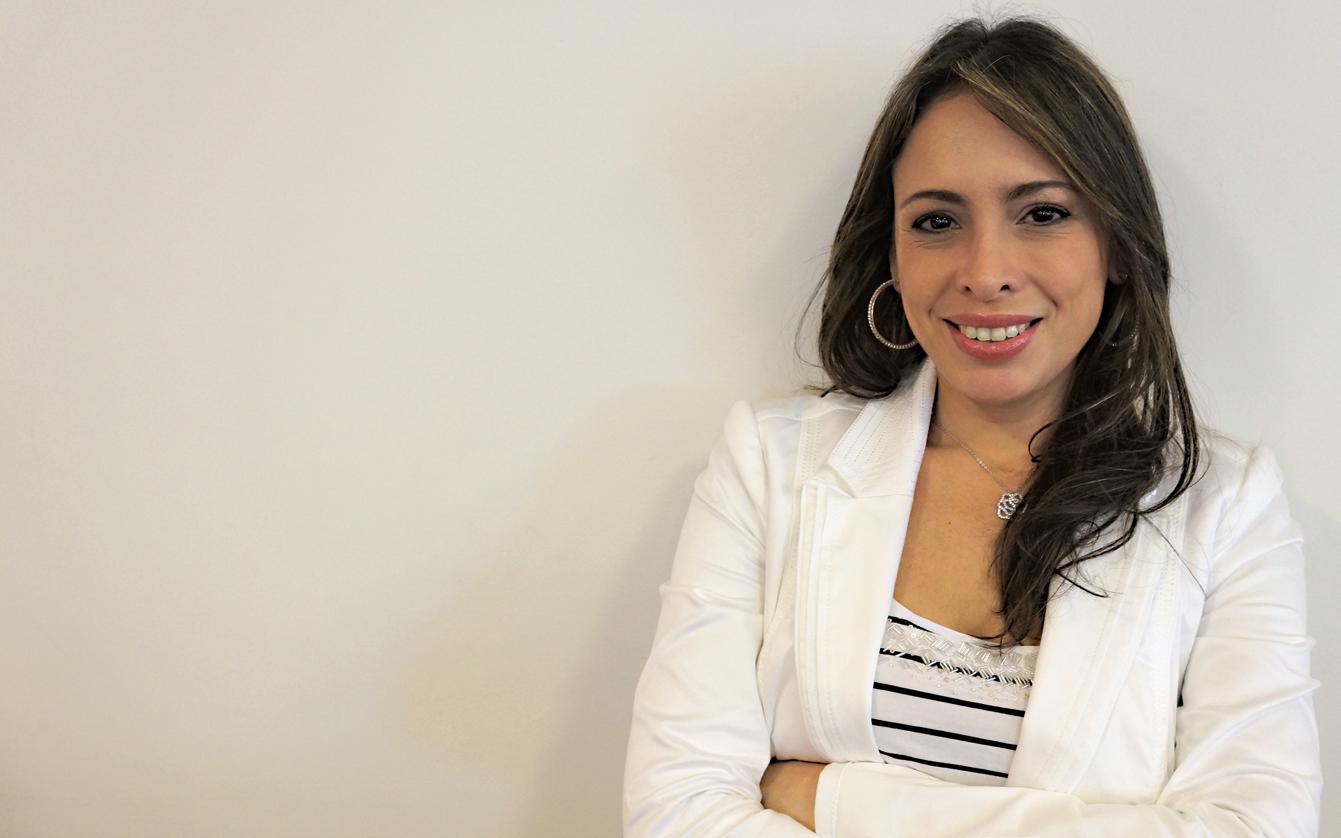
Robert Ortiz
Primary photographer for 603
Diversity is Robert Ortiz of Robert Ortiz Photography. Ortiz began his photographic career at 15, and has chronicled everything from local weddings and events to the lives of the native peoples of the Peruvian Amazon. He lives in Rochester with his wife and son and 15-year-old daughter, Isabella, who is currently in training as his photo assistant.
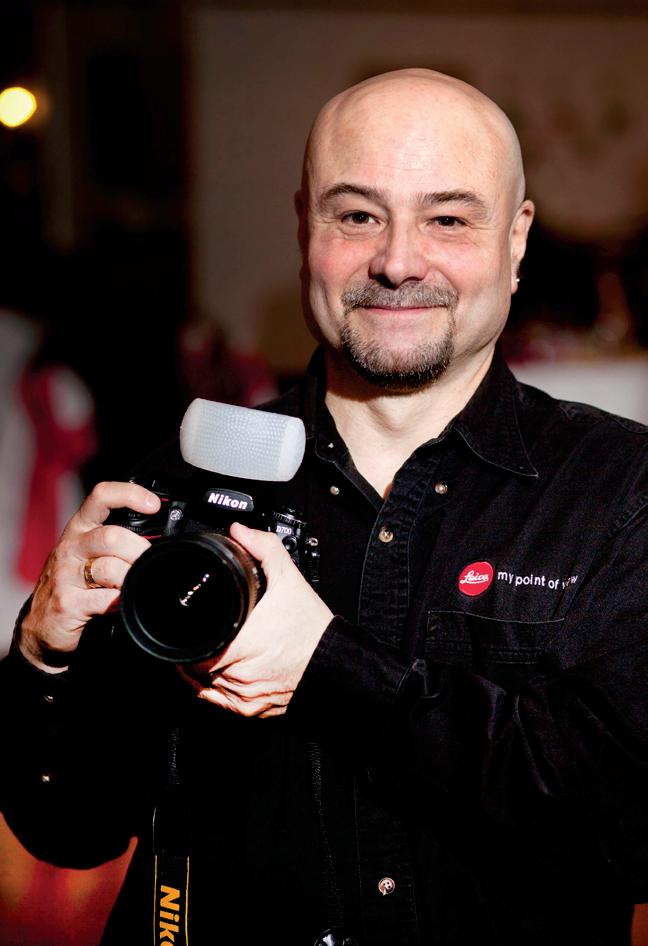
Richard Haynes
603 Diversity stories emphasize not only how things are, but how they might or even “ought” to be as we seek out and reveal our state’s diverse communities. When we needed a single image to summarize the mission of this magazine, we went to a man who has long been telling complex stories with bold strokes of color and universal symbols. Artist Richard Haynes provided a selection from his recent work for this purpose. See page 5 for how you can fashionably spread the good word.

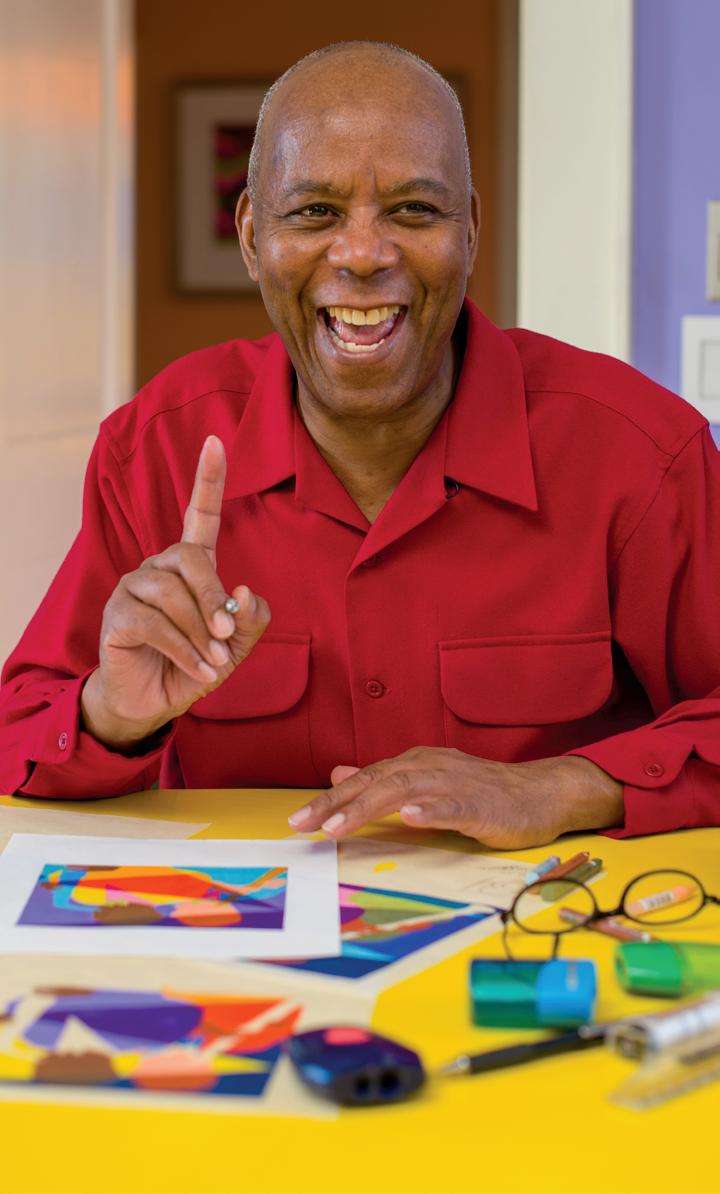
Live Free and Rise
603Diversity.com | Autumn 2023 7
Photo by Jeremy Gasowski/University of New Hampshire
ARTBYRICHARDHAYNES
Artwork by Richard Haynes: artistrichardhaynes.com
Courtesy photos
Slam Free or Die Power of Poetry Illuminates the Diverse Human Experience
n BY CAROLINA VALENTI
Poetry is the language of the soul, and great poetry opens a portal that yields keen insight into the human condition. The power of the spoken word inspired Mark Palos to found Slam Free or Die in 2005, an event that has been held on Thursday nights at Stark Brewing Company since 2011.
The event features a diverse group of poets who perform in a small function room adjacent to the brewery, broadening their understanding of race, sexual orientation, relationships and many other topics. Slam Free or Die extends this invitation to whoever wants to share.
The slam features local poets like Army veteran Seth Adam Smith, who recited a poem one evening in May dedicated to his daughter, “…crying in 3, 2, 1.” Other poets read works focused on the struggle to survive, lost love, domestic abuse, suicide, rape and even the “Me Too” movement.
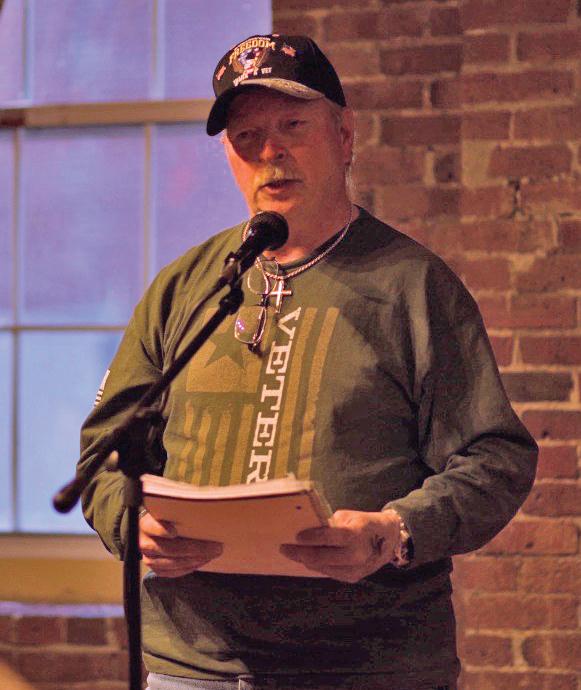
Sometimes the event draws celebrities. That same May evening, Amber Tamblyn, who starred in the TV sitcom, “Two and Half Men” and the film, “The Sisterhood of The
Traveling Pants,” and her partner, Derrick Brown, a screenwriter, came to Manchester to perform their show, “Pretend Is a Boat.”
At times, the atmosphere can feel heavy. The intensity and depth of the poems evoke strong reactions from regulars such as Ann Kinne, a transgender woman who has been attending the event for almost a decade. She originally joined the poetry slam community because it gave her a sense of belonging.
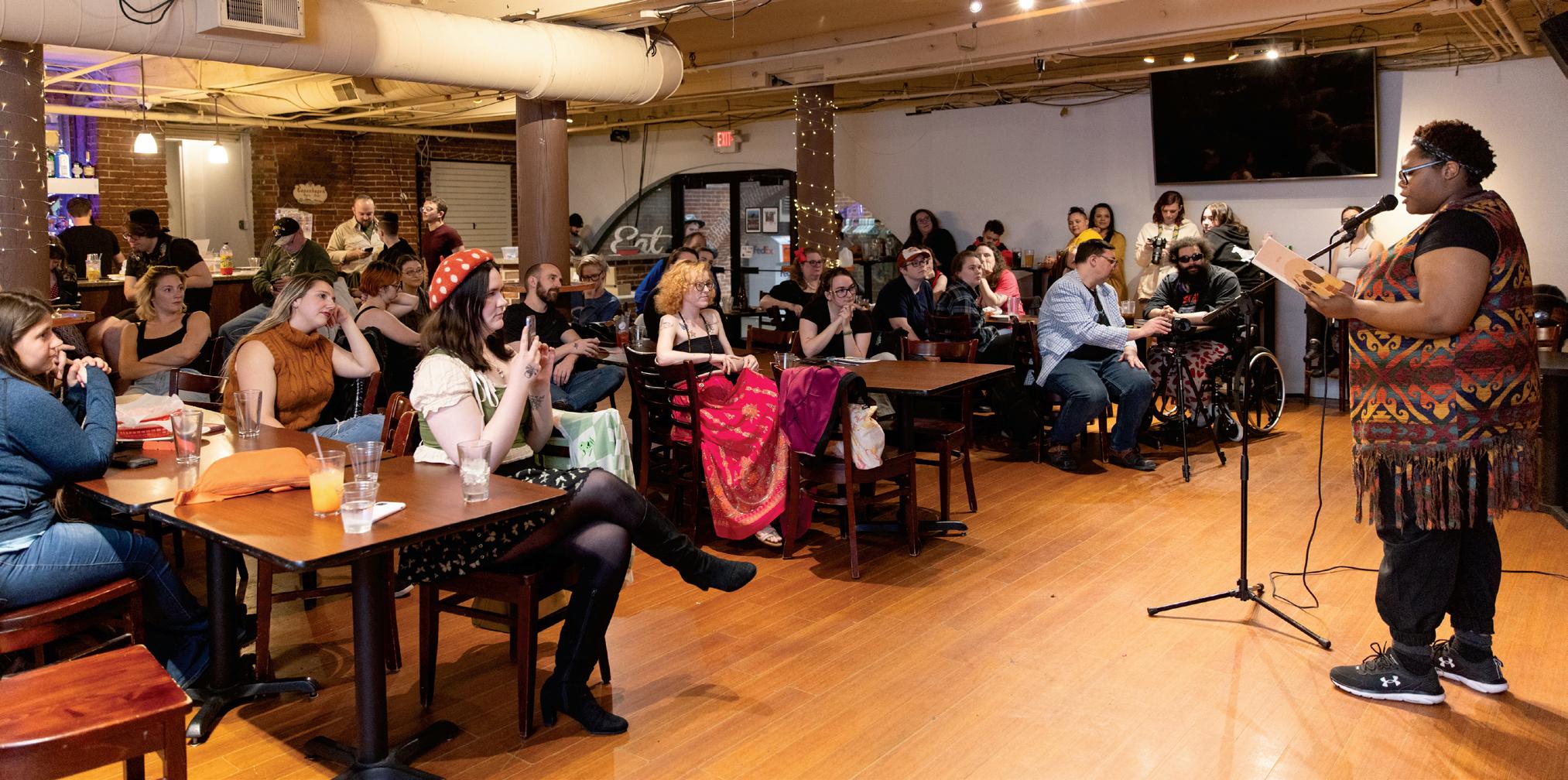
“This is the best sense of community that Manchester has, best as a queer community,” she says. “(There are) lots of friends hanging out, and Manchester is a very lonely place. There is not a lot to do, and it’s boring. This is probably the best thing that happens every week.”
It’s a community where Kinne felt it was safe to express herself.
“Coming here, I came out as trans, I changed my name, and it was all because this place allowed it,” she says. “There is literally, as far as I can tell, no other place in Manchester or like north of Boston where that would be facilitated.”
The crowd was still assimilating harsh confessions disguised in well-articulated words when laughter burst out with the mention of Taylor Swift. The picturesque description by one of the poets and having her dream to see Swift in concert come true (in pouring rain) sent the whole room
8 603Diversity.com | Autumn 2023 UPFRONT
Seth Adam Smith, an Army veteran, reads one of his poems at Slam Free or Die in Manchester last spring. (Photo by Carolina Valenti)
Merlyne Desire reads her poetry during a recent Slam Free or Die event at Stark Brewing in Manchester in May.
Photos by Kendal J. Bush Photography
reeling in uproarious laughter.
Merlyne Desire, an amateur poet who hit the stage for the first time that night, wooed the audience with sweet verse dedicated to the woman of her dreams.

For the main event that night, Tamblyn and Brown performed serious poetry laced with comedy and live imagination. They greeted the audience wearing motorcycle helmets. During their make-believe cross-country tour, they rode in the middle of the rain, encountered biker gangs, and endured other uncomfortable but hilarious experiences.

Their readings — sometimes funny, sometimes sarcastic and tragic — offered a glimpse of Hollywood’s hypocrisy.
“As a writer, I love the feeling of reading things that are very vulnerable in front of a crowd and an audience that are also doing the same thing,” Tamblyn said after the show. “They are also reading vulnerable
things that they have never read outside, that live in their minds.”
Tamblyn also performed poetry about direct involvement in bringing the infamous Harry Weinstein to justice. She was one of the founders of the “Me Too” movement and one of the celebrities who physically appeared in court during the disgraced mogul’s trial.
She and Brown ended their show by slowly descending to the ground to sing “My Heart Will Go On” in what became a very “Titanic” moment.
“Here, you can feel people listening,” Brown said. “Like they were sucking in the words. It’s kind of inspiring, and as you can see, we had more fun, we cracked more jokes, we felt more engaged ... you want to give more when the audience gives more, and this audience gives a lot.” 603
603Diversity.com | Autumn 2023 9
Amber Tamblyn and Derrick Brown perform their show, “Pretend Is a Boat,” at Slam Free or Die in Manchester in May.
Portsmouth Assistant Mayor Joanna Kelley wants New Hampshire to apply its “Live Free or Die” motto to all of its residents as the state embraces its newfound diversity.

10 603Diversity.com | Autumn 2023
Photo courtesy of SAACC
Portsmouth’s Assistant Mayor Joanna Kelley
n BY BETH SANTOS / PHOTOS BY ROBERT ORTIZ
‘Live Free or Die’ Must Apply to All New Hampshire People
Take a step into Cup of Joe Coffee Bar on Market Street in downtown Portsmouth, and you’ll find yourself surrounded by exposed brick, trendy lighting and the whir of an espresso machine.
But take a closer look and you’ll discover more: progressive signage that reminds us to “stop telling people of color their realities are illusions,” a shelf of personal mugs left by café regulars, and a favorite T-shirt for sale that declares, “Drink Coffee Fight Racism.”
It’s also one of the few places where you might find yourself being served by none other than Portsmouth’s Assistant Mayor, Joanna Kelley, Cup of Joe’s owner.
“It’s a space where I feel like everyone is welcomed and included,” Kelley says. “We hope that people will come there with an open mind and have conversations. This is my public safe space.”
Kelley started the café and bar with another Joe Kelley, owner of two Portsmouth establishments: The Thirsty Moose and Fat Bellys. She runs it like a family, offering her staff generous benefits like guaranteed pay minimums, 401(k)s and parental leave. She even helped one employee navigate the process of buying their first car.
If you know Kelley, none of this is surprising: creating safe spaces and lifting the next generation of citizens is an enormous part of her raison d être, her ethos.
“I remember so uniquely what it was like. I am not far removed from living paycheck to paycheck, or shift to shift,” Kelley says. “If you talk to people who grew up in relative poverty, and really are trying to escape it, it never leaves you that you always feel like you can you’re like one step away from sliding back into it.
“A lot of kids that work for me grew up in systems similar to mine,” she says. “I’m trying to help them in a way that (I didn’t have); there wasn’t always somebody there guiding me.”
A New Hampshire native raised in Rochester, Kelley’s childhood was difficult. When she wasn’t being raised by her grandparents, she was a ward of the state who lived at Dover Children’s Home. She grew up as the only person of color in her family. She was the first person in her family accepted to college but couldn’t receive enough financial aid to graduate.
Kelley’s lack of a college degree and her upbringing as a mixed-race kid in a conservative white family were chips on her shoulder for a long time.
“There was a part of me that felt like I couldn’t represent race-related things because I wasn’t Black enough. That’s an issue I’ve had throughout my whole life,” she says. “I’ve said things and people have made comments like, ‘Oh, well, you have a white mom,’ or ‘You don’t know what it’s like,’ or ‘You don’t have friends of color.’ So I felt like I was not allowed to have an opinion about those things.”
Over time, Kelley began to realize that her unique life experiences were also her power. Being passed up for a job opportunity because she didn’t have a degree was the catalyst that started her entrepreneurial career. When she was elected Portsmouth’s first Black Assistant Mayor in 2021, Kelley realized her shortcomings were opportunities for her to speak up for others.
“There’s a lot of Americans who don’t have college degrees who deserve representation and don’t feel represented. And there’s a lot of people who went to school and had to drop out because of financial pressures,” she says. “And there’s a lot of small business owners who are struggling on how to balance their books. More and more I’m coming to the acceptance of you know, there is a bigger demographic that I could represent.”
Kelley has already navigated ups and downs in her political career; a casual tweet turned into a firestorm of fury leading to
603Diversity.com | Autumn 2023 11
national news and death threats, while her public self-identification as a sexual assault survivor attracted almost no media attention at all.
“It’s hard to be the first,” Kelley says. “There’s this microscope on you.”
In 2021, Kelley teamed up with Chef David Vargas and business owners Marie Collins and Evan Mallett to host the first New England BIPOC Fest, which celebrates BIPOC (Black, Indigenous, People of Color) music, art and culture across the Granite State and beyond.

“I believe politicians’ first job should be activists. You should be figuring out how to better the lives of the people that elected you and people all around,” Kelley says. “You have to make tough decisions. But if you don’t stay within that core value system, which got me into this role, you know, then what am I here for?”
While New Hampshire has a way to go before becoming a truly inclusive state, Kelley applauds the progress that has been made so far.
“I was one of three black kids in my graduating class of 600, and now I go to elementary schools where there’s a dozen. I know, to some people, that seems like such a minute thing,” she says. “But, you know, for someone who grew up here, it’s such a big thing.
“I think I tend to be I think more gracious in the progression of it, even though it’s still slow, because I’ve seen the full growth. Now we have things like the BIPOC Festival and we have the NH BAPOC, the Business Alliance for People of Color. I would have never in my life thought like I would see that.”
The New Hampshire that Kelley wants to see isn’t just one that’s free: It’s where people are free to be who they are.
“It’s the New Hampshire that doesn’t forget what we fundamentally are. We became an independent state six months before the Declaration of Independence,” she says. “We always say, our ‘Live Free or Die” state. But there’s a second part of that motto, which is ‘Death is not the worst of evils.’ The whole quote from John Stark is ‘Live free or die: death is not the worst of evils.’”
And we forget that second part, and that second part to me means that a lack of representation, a lack of community, a lack of free rights is way worse than death. I hope, as a state, we are able to fundamentally grasp that concept,” Kelley says.
“The worst is living in a place that you love that doesn’t love you. So I hope we get to a place in our state where nobody ever has to question if they’re wanted here or welcomed here, or if they belong here, whether they have been here, you know, for 10 generations or for 10 minutes,” she says.
“And we’re a small enough place that you can come here and make an impact and develop a community overnight. And that’s one of the reasons I love it here.” 603
12 603Diversity.com | Autumn 2023
“I believe politicians’ first job should be activists. You should be figuring out how to better the lives of the people that elected you and people all around.”










603Diversity.com | Autumn 2023 13 DO YOU KNOW SOMEONE WHO IS BEHIND IN PAYING MORTGAGE, PROPERTY TAXES, ASSOCIATION FEES, OR UTILITIES? The NH Homeowner Assistance Fund Program provides assistance to eligible NH residents who have been affected in any way by an increase in expenses or a reduction in income as a result of the COVID-19 public health crisis. Find out more at HomeHelpNH.org HomeHelpNH.org For program details and to apply. HomesAhead.org For application assistance, financial counseling and other resources. 603LegalAid.org For assistance with an immediate threat of foreclosure, tax deed, or sheriff’s sale. The NH Homeowner Assistance Fund program is funded through the American Rescue Plan Act of 2021 and the Governor’s Office for Emergency Relief and Recovery (GOFERR). It is administered by New Hampshire Housing. What Matters To You, Matters To Us Fraud Monitoring & Resolution* with free credit report every 90 days Family Plan Included for spouse and household dependents FREE through 2023!* Better Checking Account with *Registration/activation required. Maintenance fee of $4.99 per month waived through December 31, 2023 for new Better Checking accounts. Visit trianglecu.org for full details. trianglecu.org (603) 889-2470
NEW HAMPSHIRE’S
Ethnic Food Markets
Offer Diverse Items that Electrify the Palate
n BY EMILY REILLY / PHOTOS BY ROBERT ORTIZ
As New Hampshire’s diversity grows with an influx of new residents from all over the world, ethnic food markets located in different parts of the state are meeting the demand to give them a taste of home and an open invitation for everyone to discover new dishes.
Four of these markets located in Manchester, Concord, Rochester and Keene provide daily sustenance to their shoppers by offering ingredients they cannot find anywhere else.

14 603Diversity.com | Autumn 2023
MERCY OF GOD AFRICAN MARKET
91 Maple Street, Manchester
Center of the Yam Universe
is known as the “yam belt” for good reason — it’s the world’s largest producer of the vegetable. It’s used to make pounded yam, a starchy food usually eaten with soups or stews.
Nigeria
At Mercy of God African Market in Manchester, customers can find a steady supply of that prolific root vegetable, says owner Beatrice Adekoya, who was born and raised in Ilawe Ekiti State, Nigeria. After living in Akure Town, Ondo State, Adekoya and her family relocated to Boston in 1998, then settled in Manchester in 2004.
She went into business in 2004 after seeing a local need for ethnic food from her region like pounded yam, which is boiled, sliced, formed into a doughy consistency and eaten with stew — no seasoning needed.
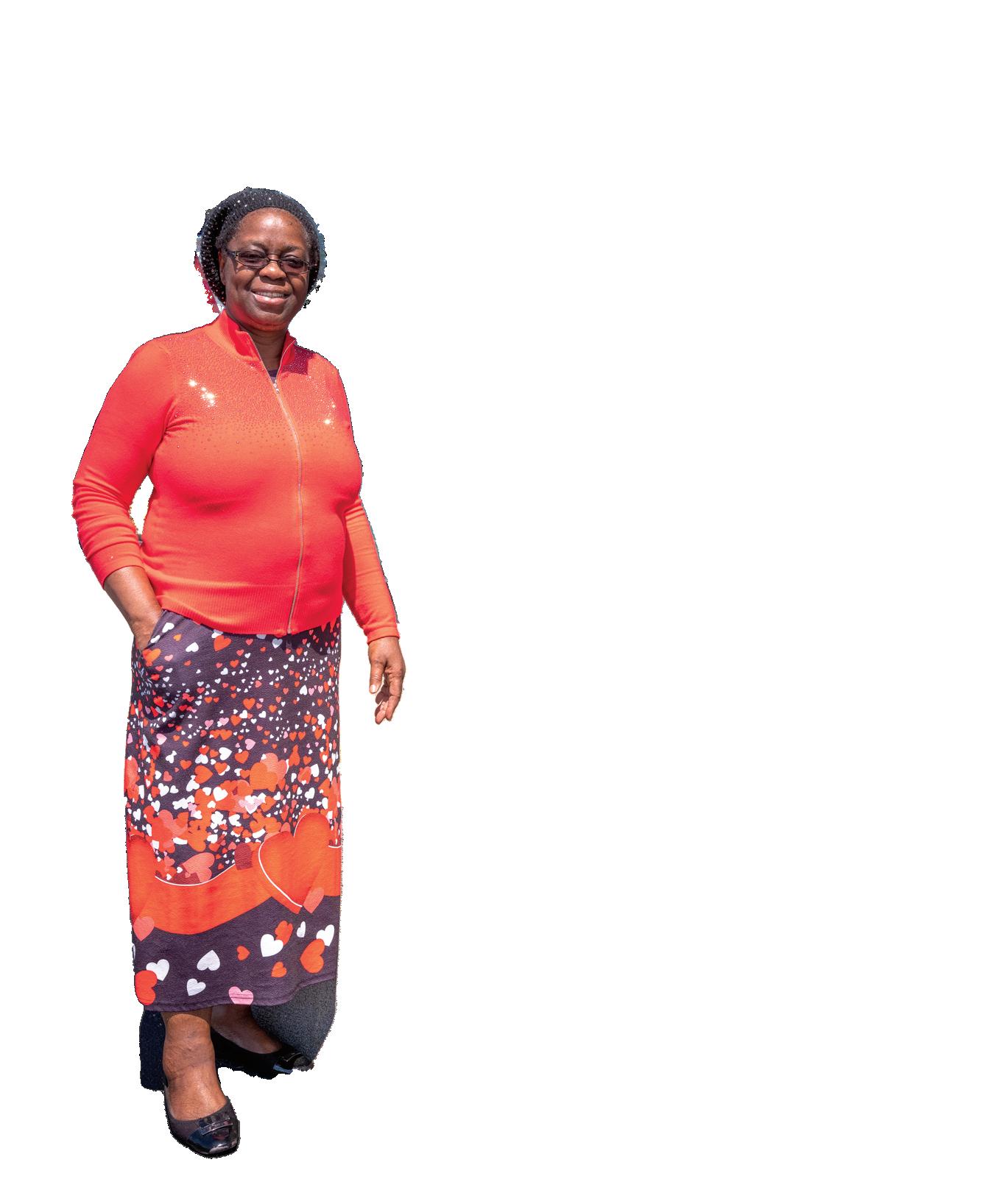
“These are delicious dishes people are craving,” she says.
The market also carries beans, beef, goat meat, fish, shrimp, spinach, kale, collard greens, seasonings, and garri — cassava flour — used in fufu, a popular pounded meal known as a “swallow food.”
You can also find ingredients to make Nigerian delicacies like jollof rice with onions, spices, tomatoes and meat or fish; Amala, made with cassava, yams or plantains and served with ewedu (jute leaves soup); okro soup; and efo riro — a spinach stew.
“The foods from my country are organic, healthy and nutritious. No fats, no additives,” Adekoya says.
They also sell household items like African dresses and art supplies, and Adekoya’s biography, “My Name Is A.Y.O (Joy).”
The local reaction to her store has been more than welcoming.
“God is helping us. People are responding positively,” she says, adding that they’re in the final stages of opening the restaurant portion of the market.
Adekoya’s personal favorites include rice and stew: boiled white rice in a stew seasoned with beef or fish and tomatoes, habanero peppers, red bell peppers, groundnut oil (also known as peanut oil); and pounded yam and Egusi soup with meat or fish.
“What I personally like about Egusi soup is that it’s organic, rich in protein, vitamins and antioxidants, and is delicious. These are staple foods of Yorubas, and I still enjoy them up to this day,” she says.
Yam Porridge
Yam

Red bell pepper
Habanero pepper
Salt
Bouillon
Palm oil
Crayfish, shrimp or fish
Wash, peel and cut the yam into small pieces. Cook in a pot with water for about 15 to 30 minutes. Blend the peppers and add to the yam once it’s partially cooked. Add crayfish, palm oil and seasoning to taste.

Cover and cook until soft.
Serve on a plate.
Fried Yam
Wash, peel and cut the yam into small pieces. Cooked yam, cut into pieces
Add salt, pepper and bouillon
Fry in vegetable oil until golden
Pounded Yam
Wash, peel and cut yam into pieces. Add to a pot of water and cook for 10 to 15 minutes or until soft, then pound it into a dough with a mortar and pestle or food processor.
Add water as desired.
Pounded yam is mainly eaten with Egusi soup, okro soup, vegetables or efo riro, and can also be roasted.
603Diversity.com | Autumn 2023 15
Photo by Robert Ortiz
Beatrice Adekoya, owner of Mercy of God African Market in Manchester, is originally from Nigeria and has lived in Manchester since 2004.
ANEKA MARKET
159 Rochester Hill Road, Rochester
The Lilac City’s Far East Connection
neka means lots of varieties,” says Jane Albertina, president of Aneka Market in
Its name rings true. Aneka Market offers Indonesian and Asian beverages, canned fruit, instant seasonings and meals, savory and sweet snacks, condiments and noodles, as well as Japanese, Korean and Thai food — all big sellers, Albertina says.
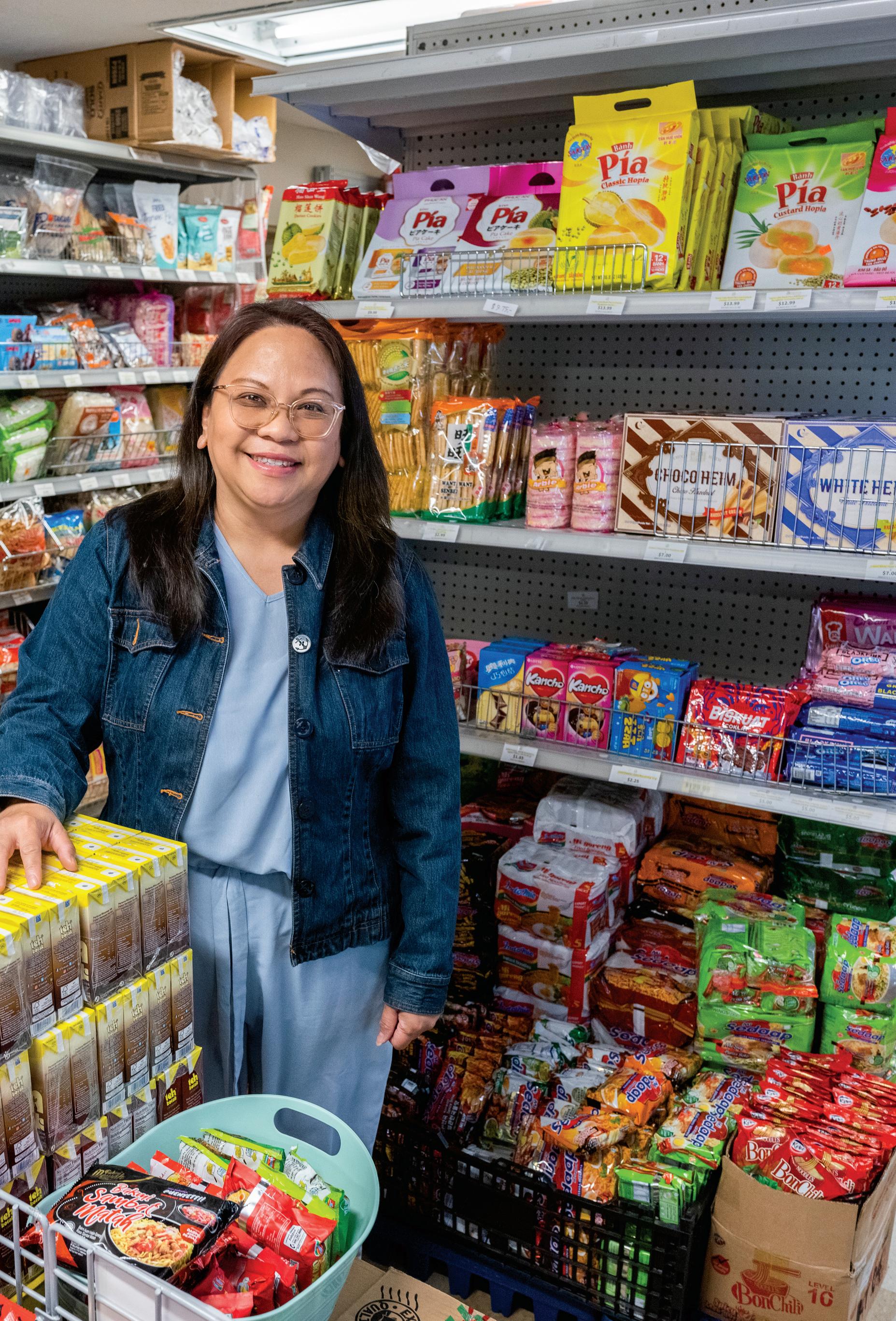
“We also love to introduce Indonesian food/grocery to the community. People love the adventure of trying new items from different countries,” she says.
In 2006, she and her husband settled in Rochester from Bandung, West Java, so that he could be the church’s minister. Since its inception in March 2021, the market, owned by the New England City Blessing Church, has been a center for the large Indonesian community around the city and a place to host cultural events.

Albertina seeks to further connect her Indonesian upbringing with her American surroundings by incorporating local, ethnic food sources into her offerings, like fresh tempeh (fermented soybeans) manufactured buy BOStempeh in Somersworth.
“Tempeh is one of the main protein sources that Indonesians eat daily together with tofu. BOStempeh provides ‘taste like home” tempeh,”
Her culinary history, flavored by her mom’s
Indonesian Rendang Curry
500g (12–18 ounces) beef, cut into pieces
One stalk lemongrass
½ coconut, which yields about 700 ml (24 ounces) of coconut milk, OR mix 65 ml (2 and ¼ ounces) thick coconut milk with 600 ml (20 ounces) of water.
1 package of Bamboe Rendang instant spice
Three lime leaves
Add meat to a pot of simmering water. Boil cubed meat until tender. Allow 2 cups of broth to remain in the pan.
Strain (24 ounces) coconut milk from ½ a
home-cooking, represents a deeper cross-section of Indonesian food.
“Even though food vendors are everywhere in Bandung, my mom loved to cook,” Albertina says. She remembers devouring Manadonese food like Bubur Manado (vegetable porridge) and Ayam Woku, a spicy chicken dish.
Albertina’s other hometown favorites include fried chicken, fried rice, mie goreng (fried noodle) — nasi timbel (steamed rice wrapped with banana leaves), sayur asam (vegetable soup with tamarind), and cucumber with basil and sambal terasi (chili sauce with fermented shrimp).
During celebrations, Indonesians might enjoy Nasi Kuning (yellow rice), fried chicken, fried noodle, beef floss, sliced fried egg, kerupuk (crackers), and kentang balado (seasoned, fried cubed potatoes).
It’s easy to see how Indonesian cuisine varies regionally. Padang or Minang food in West Sumatra uses coconut milk and spicy chili while people in Yogyakarta and Central Java have more of a sweet tooth. One popular main course is Gudeg — jackfruit stewed with palm sugar, coconut milk, candlenut, shallot, and spices like garlic, coriander seed, galangal, bay leaves and teak leaves.
The most famous is beef rendang — seasoned meat braised in coconut milk until it’s caramelized. The lemon grass increases the flavor and aroma. While Albertina’s recipe calls for instant Bamboe Rendang seasoning, which is available at the market, other brands can be used. Canned coconut milk instead of grated coconut is OK to use.
coconut, or prepare the thick coconut milk / water mixture for later use.
Add 1 package of Bamboe Rendang instant spice to the pot and stir.

Add lemongrass stalk
Add lime leaves to the pot
Cover and simmer until meat is tender and the sauce is absorbed.
Add the coconut milk to the pot and stir. Simmer on low heat, stirring occasionally, until sauce is reduced to gravy. Add garnish and serve hot.
Courtesy Bumbu Bamboe’s Youtube page: www.youtube.com/watch?v=W4BScQZjwPY
16 603Diversity.com | Autumn 2023
Jane Albertina, president of Angela Market in Rochester, provides a wide selection of Indonesian, Japanese, Korean and Thai food items for her customers.
Where the Capitol City and Syria Converge
Aftermoving to the U.S. with his wife, a New Hampshire native, Ahmad Aissa, owner of wholesale bakery Aissa Sweets, found himself longing for food from home.

“I wanted to enjoy the familiar things that I used to enjoy,” he says.
Passionate about food and spurred by New Hampshire’s need for diversity, he started his business from scratch in 2012 to share his favorite Syrian desserts.
Today, the Concord-based bakery makes three kinds of Syrian baklava: chocolate-walnut, coconut chocolate and classic walnut; and date-, apricot- and fig-filled mamoul butter cookies, commonly eaten during Eid Al-Fitr.
The bakery also sells spinach and feta pies with phyllo dough made by hand.
Syrians are “a proud people,” Aissa says. “Mom and pop” markets are often passed down through generations, perfecting and serving “inherited” recipes. These stores also sell just one item, like cheese or meat or vegetables.
“Just go to the neighborhood — (it’s) the freshest stuff ever. That’s basically where the culture is,” Aissa says.
Other favorites include barbecued shawarma, rolled stuffed grape leaves, and almost anything made with phyllo dough.
“Mahashi” is a dish made with eggplant, Mexican squash, or peppers stuffed with meat and seasonings like walnuts and crushed red pepper and cooked in tomato sauce or yogurt sauce.
“Oh my god, it’s a religious experience for sure,” he says.
“Ful” is boiled fava beans mixed with olive oil, lemon juice, cumin, black pepper and garlic, garnished with diced fresh tomatoes and parsley.
“That’s one of the things I’m kind of addicted to. I make a lot of it,” he says.
But there are no boundaries to the food Aissa prefers. He says Syrian cuisine is a diverse “marriage” between Italian, Mediterranean and Indian-style cuisine.
Common ingredients include eggplant, zucchini, sesame seeds, chickpeas, lemon, mint, cucumbers, olive oil, fava beans, lentils and vine leaves, along with meats like lamb and sheep.
Spices also sway between Mediterranean and Indian stylesincorporating sumac, mint, basil, and turmeric. He also cooks Ethiopian and Indian food.
Syria isn’t shy about adding heat, either. An onion grown in the Salamiyah region has a “hot kick.”
“You could like smell it two blocks away and cry, and it’s really tasty,” Aissa says.
Aissa Sweets are found around New Hampshire, Maine, Massachusetts, New York State (at Haggens) and Washington State; online; and in natural food stores and grocery stores like Hannaford, Market Basket; and Whole Foods.
Spinach and Feta
Phyllo Pie
2 pounds chopped spinach, thawed
1 large onion
Olive oil
1 tsp salt
2 pounds feta cheese
Thaw two, 1-pound packages of phyllo dough
Thaw 2 pounds of chopped spinach. Squeeze out the water gently.
Dice a large onion, then stir fry with a cup of olive oil in a pan until golden. (No worries about the extra oil.)
Add the squeezed spinach to the onion. Add a teaspoon of salt, then sauté for five minutes
Put aside and place in a mixing bowl to cool.
Once chilled to room temp (about 30 minutes), crumble 2 pounds of feta cheese and mix it with the spinach mix.
Thaw two, 1-pound packages of phyllo dough
Layer 1 pound of dough, one sheet at a time, in a 17-by-12inch baking sheet. Brush lightly with olive oil. After layering the first pound, add the filling and flatten it.
Then add the 1 pound of phyllo dough, one sheet at a time, brushing lightly with olive oil.
Cut to desired size and shape, then bake at 400 degrees F for 45 to 60 minutes until the surface is dark gold.
Note the amount of liquid left in the spinach — that can impact the duration of baking significantly. Check the phyllo dough layers close to the center to make sure they cooked nicely and are not soggy.
DO NOT USE HIGH FAN OR CONVECTION SETTING! Doing so would blow your phyllo layers and make a mess in your oven. For smaller baking trays, adjust portions accordingly.

603Diversity.com | Autumn 2023 17
AISSA SWEETS 205 N. State Street, Concord
Ahmad Aissa, owner of Aissa Sweets bakery in Concord, enjoys sharing his Syrian fare with his customers
KEENE INTERNATIONAL MARKET
162 Emerald Street, Keene
All Bellies Welcome
Thesuccess of Keene International Market has been a labor of love.
Co-owner Chuda Mishra was born in Bhutan, South Asia, and grew up a refugee in Nepal. He met New Hampshire native and co-owner Jennifer Carroll in Laconia while she was helping refugee families.
After settling in Keene, the two noticed the lack of Nepalese food locally. They began with an online store and pickup location in Keene in 2020 and opened their market four months later.
“Our goal was to help our customers feel like they could find a piece of their original home,” they both say.
With the tagline “All bellies welcome,” Keene International Market offers more than 2,000 items from more than 30 countries: snacks, drinks, noodles, houseware, even Japanese anime stickers. They also sell international candies, potato chips with exotic flavors -- prawn, shamrock and sour cream, Indian masala and roasted lamb -- and keep a steady supply of Thai, Korean, and Nepalese noodles.
They say Filipino customers prefer Japanese age ichiban (rice cracker snack) and Guatemalans savor Korean lobster-flavored ramen bowls.
Residents are taking notice.
“One young FIlipino woman who was in shopping with her mom put it succinctly, ‘Your store is not just a great place for us to buy Filipino food; what you are doing is validating our presence in this region. It feels important,’” says Jenna.
Just as Chuda and Jennifer found common ground, customers are making connections too. Shoppers seeking comfort food might leave with items from other countries, or share recipes.
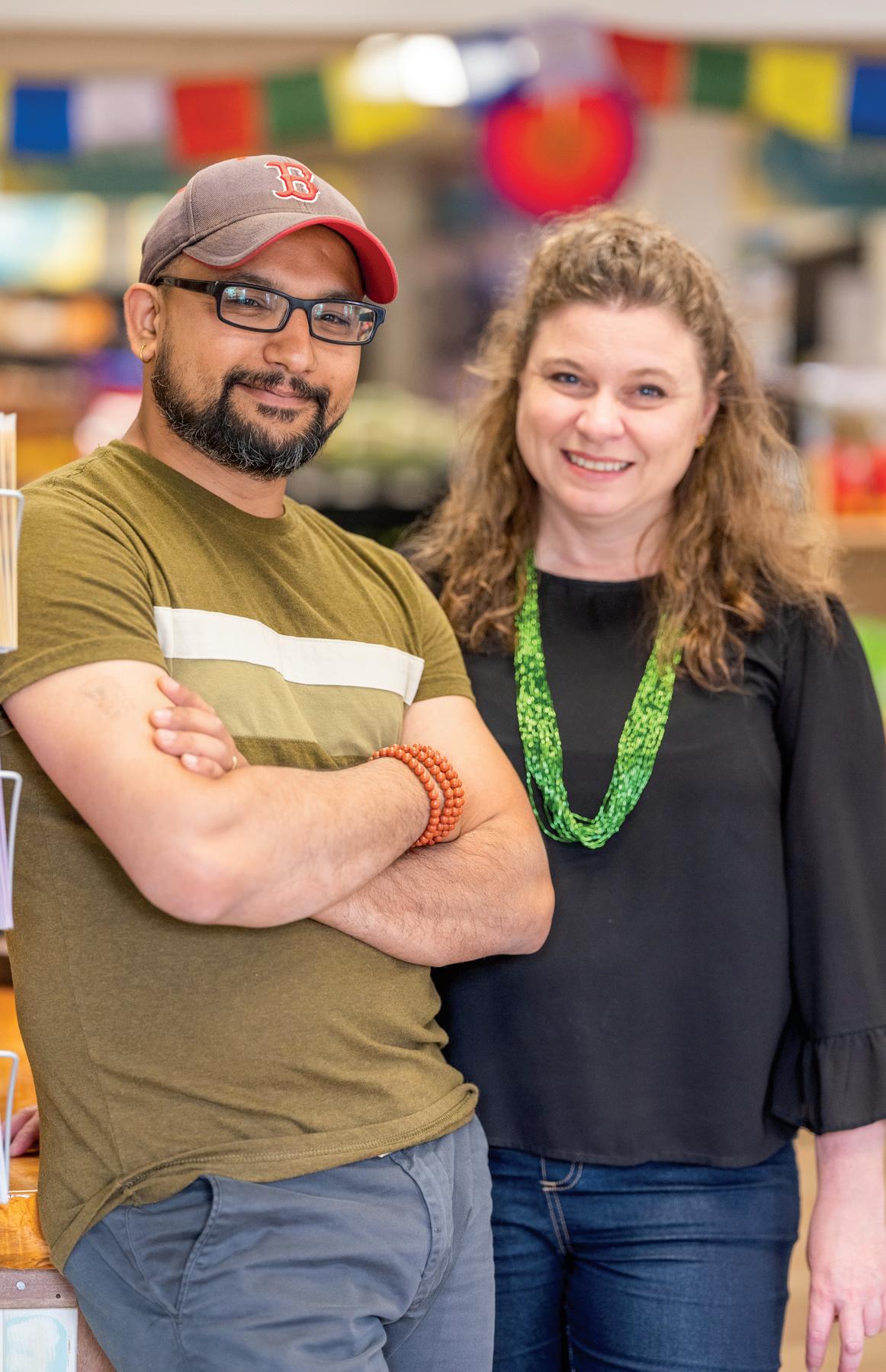
Local products line the shelves, like Syrian baklava from Aissa Sweets in Concord; Finnish nisu (cardamom bread) from Finnish Mama in Fitzwilliam; alfajores (Latin American shortbread cookies) from Keene Cookie Company, and international extracts from Sweetwater Co. in Gilsum.
Besides traveling to Boston, NYC and New Jersey for products, Chuda finds Indian curries at Kay’s Curries in Massachusetts, and Dosa batter from Dosa Kitchen in Brattleboro, Vermont.
“He knows he’s fulfilling a need in the community,” Jennifer says of Chuda’s work.
Their market has become a lifeline for residents who are miles away from their homeland.
“Baby bok choy and Indian okra, for example, are staples in many people’s weekly diets. That is important,” Chuda says.
“Chatpate is a great summer recipe. We often bring it to potlucks and dinner parties etc. This easy-to-make crunchy salad has dry instant noodles, veggies, puffed rice, and potatoes. Nepalese instant noodles tend to have a bit of spice in the noodle itself so the flavor is great, Chuda says.

Chatpate
3 bags of WaiWai or RumPum instant noodles
chili packets from the noodles (Discard the oil)
½ cup cucumber, diced
½ cup potatoes boiled, chopped into small bites
½ cup frozen peas
1 red onion, chopped
½ cup tomatoes, chopped
½ teaspoon salt
1 teaspoon cumin powder
1 green chili chopped
1 tablespoon Lemon Juice
Freshly chopped cilantro
2 cups puffed rice
A bit of oil
Add all the ingredients (except puffed rice) to a large bowl and mix well.
Add the puffed rice. Give it a gentle stir and serve. (Adding rice in the later stage retains its crunchiness.)
18 603Diversity.com | Autumn 2023
Chuda Mishra and Jennifer Carroll, co-owners of the Keene International Market, offer several food items, fashions, art work and cookbooks from around the world in one place.

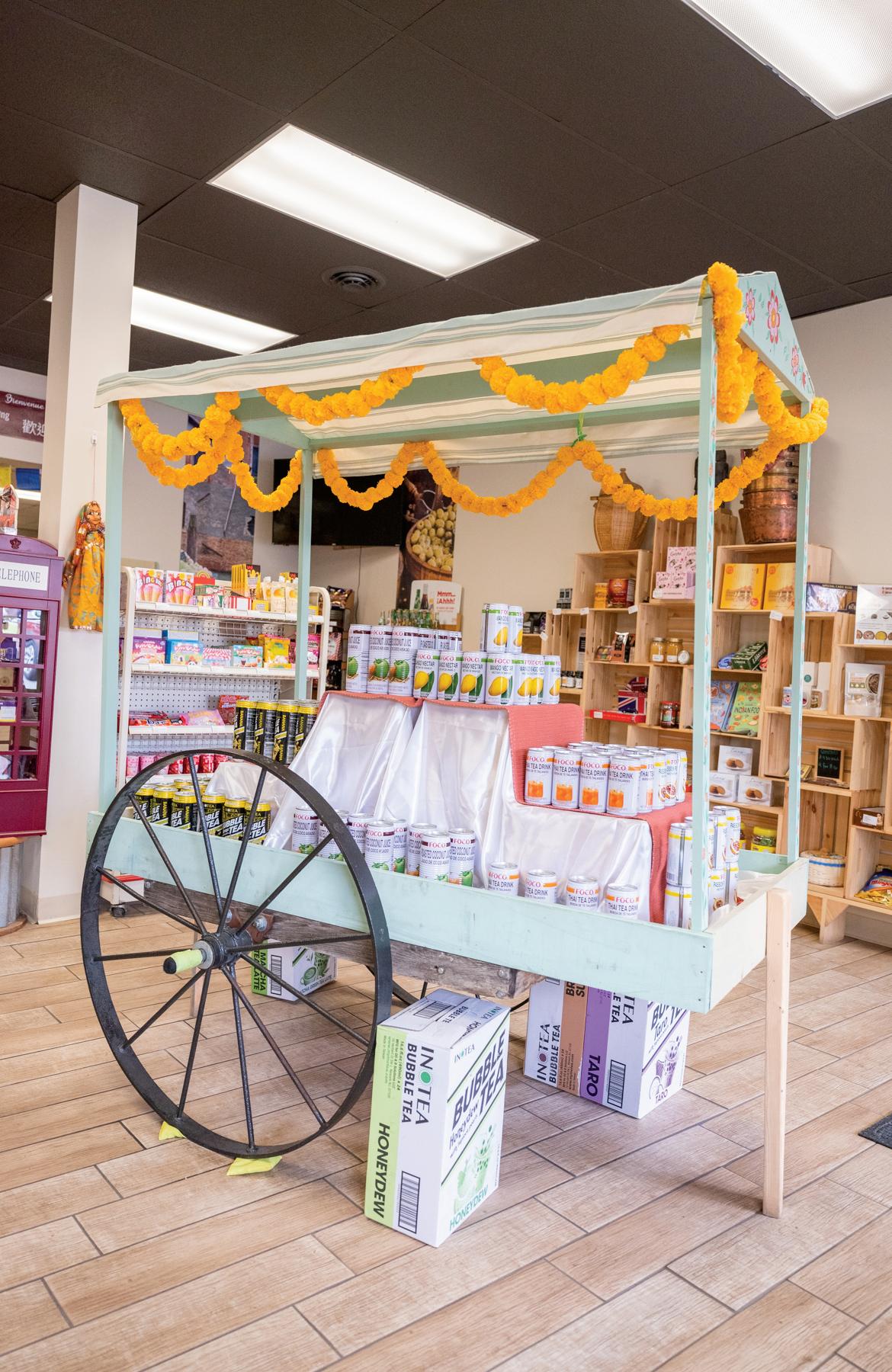
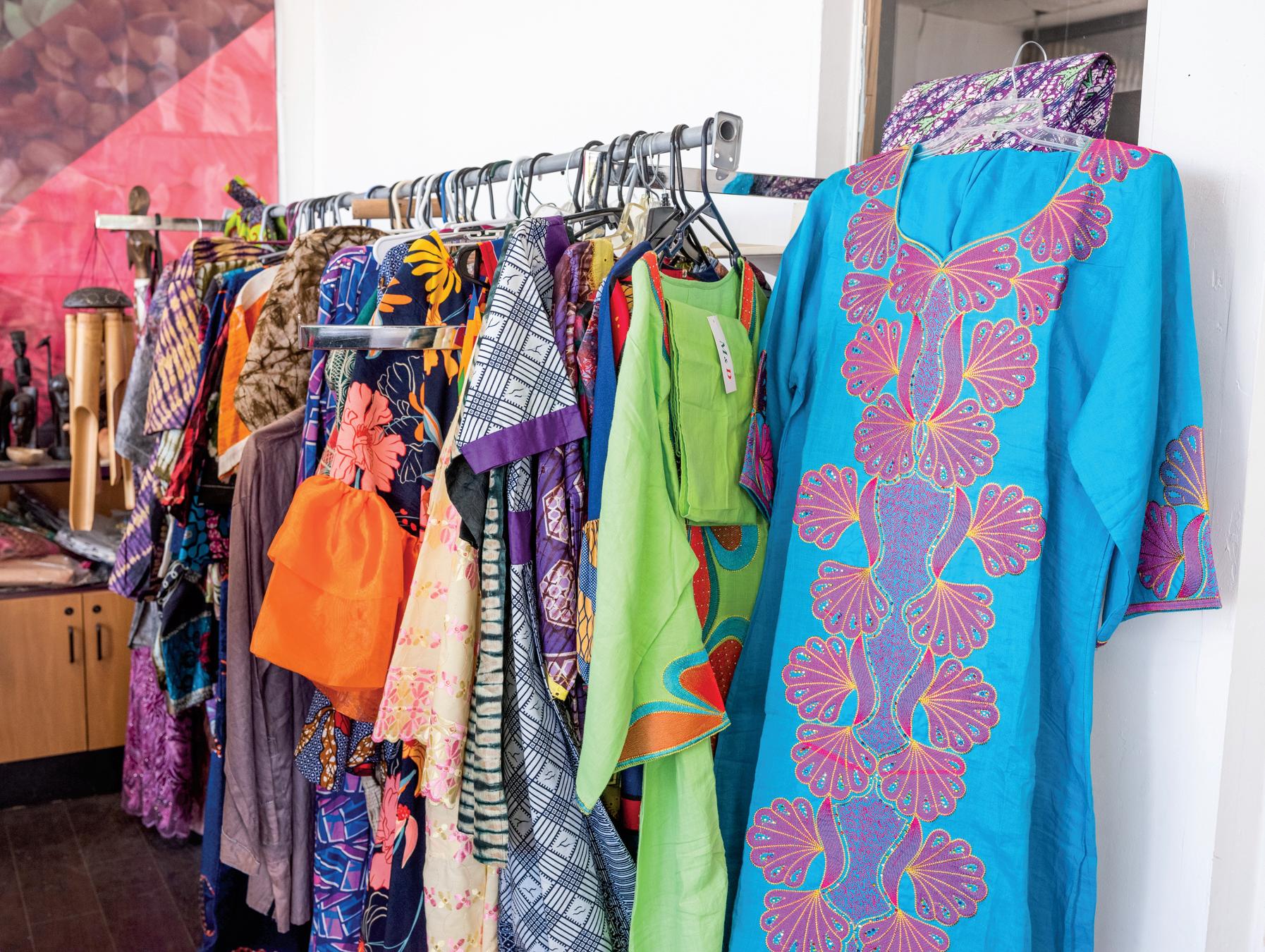


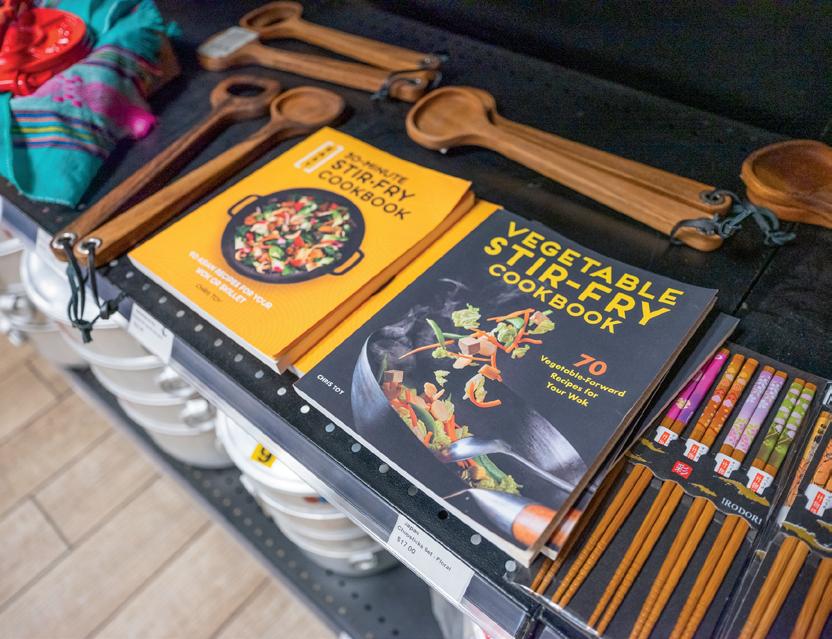
603Diversity.com | Autumn 2023 19
New Hampshire is blessed with ethnic markets that provide patrons with a taste of cultures from around the world.
From Middle East to NH
A Syrian couple’s journey is aided by SNHU’s DEI Mission
n BY BETH SANTOS / PHOTOS BY ROBERT ORTIZ
A cold wind whipped over Khaleel Shreet’s ears while he pumped gas into a customer’s vehicle. It was January in Manchester, and while Khaleel had entertained some thoughts of what life in the Granite State would be like, he never could have anticipated the brittle temperatures of an unforgiving New Hampshire winter.

Khaleel, who was born and raised in Syria, had enrolled at Southern New Hampshire University to continue his education while escaping the Syrian civil war. He knew just one other person in the United States.
Unlike other international students who participated in clubs and activities, Khaleel worked 16-hour days at a restaurant and a full-service gas station in order to afford his tuition, leaving little time — or money — for anything else. He wavered daily between feelings of fear for his family’s safety and was overwhelmed with
After Rimi and Khaleel Shreet benefitted from SNHU’s programs, they are now paying it forward by helping other students who were once in their position, so they can also get a college education.

his living situation where he was barely making ends meet.
“I remained positive, optimistic,” Shreet says. “That’s the thing that helped me go through it all. I had a firm belief that it was just temporary, and I was just waiting for better opportunities to come up.”
Halfway through his master’s degree, a faculty member at SNHU reached out to Shreet. “He said, ‘You’ve been a good student, you’re working hard on your studies, and I see you’re working long hours here as well. We may have opportunities for people in your circumstances,’” Shreet recalls.
20 603Diversity.com | Autumn 2023
That conversation led to a sit-down meeting with SNHU President Paul LeBlanc. Shreet still remembers it as a pivotal moment in his life: “That meeting flipped my life upside down.”
SNHU offered Shreet a full scholarship to cover the second half of his master’s degree and a job. He went on to receive his doctorate in educational leadership, and SNHU paid for his wife, Rimi, to take ESL classes and find a job as well when she relocated to the U.S.

Today, Shreet works at Duet, an SNHU program that helps provide academic coaching to help highly motivated students earn a degree more quickly and inexpensively — people who were once in his position.
SNHU has had an extraordinary journey in supporting nontraditional students like Shreet. Since 2003, the school has grown from 2,800 to over 185,000 students and is the largest nonprofit provider of online higher education in the country. It owes much of that success to its competency-based model, which focuses on helping learners access education at their own pace, wherever they are in the world.
“SNHU is a higher ed disrupter,” said Jada Hebra, SNHU’s chief diversity and inclusion officer. “The belief is that everybody’s capable; it’s just that everybody doesn’t have the same chances. And so how can we get the most possible people to get a bachelor’s degree, period?”
Demographically, SNHU serves 40% students of color, with as many as 50% of students with low or moderate income. It serves more Black students than the largest historically Black college or university. The community it serves reinforces the university’s core belief that true inclusion starts with identifying and breaking the barriers that limit individuals.
As a director of Duet, Shreet works with people who are trying to make a difference, he says.
“I learn about my students. I try to have a good understanding of their backgrounds, their challenges, and be there for them as a genuine friend,” he says.
Part of the mission is to simplify the educational experience.
“We’re focused on getting people college degrees. Many of them tried college before and couldn’t make it happen because of systemic barriers,” he says. “We’re committed to breaking down these barriers. I’m very happy that we’re making it happen.”
SNHU has developed several initiatives to make a college education more affordable and accessible to underserved communities who would otherwise not have this opportunity. Some of these programs include:
• The SNHU Center for New Americans. Opened in partnership with YWCA NH in 2017, the center addresses the educational needs of New American families in Manchester. The center serves 100 to 125 youth on a weekly basis during the school year, and up to 200 people total when including English as a second language programming, competency-based higher
education and community-building events.
• The Chandler Center encourages SNHU students to practice civic engagement and become active citizens in their communities.
• The Global Education Movement offers university degrees to refugees around the world. Since 2017, the program continues to be a large-scale, online learning initiative for refugees. SNHU works with in-country organizations to deliver high-quality, low-cost education that meets the needs of displaced learners.
SNHU also offers Community Partnership programs that help people earn degrees with competency-based education. Instead of attending classes and lectures followed by exams, learners demonstrate a mastery of skills in key business areas. Once they complete 60 competencies, they earn a degree.
While the majority of students take classes online from around the world, about 3,000 students take classes on the Manchester campus. Hebra hopes New Hampshire will continue to evolve and grow when it comes to embracing diversity, equity and inclusion.
“I want it to live up to its motto. You know, ‘Live Free or Die,’” she says. “And I know, that can be taken in many different ways. But the way I think about it is, you know, truly letting people live free and be who they are.”
Hebra also would like to see more young people move to New Hampshire.
“There are great things in the state. And I think, if we can signal that we are open minded, and that we actually do live our motto, truly, I think we would attract a whole lot more people,” she says. 603
Today, Shreet works at Duet, an SNHU program that helps provide academic coaching to help highly motivated students earn a degree more quickly and inexpensively.
DEIB at Dartmouth Cancer Center
DARTMOUTH HEALTH DIVERSITY EFFORTS REACH ANOTHER MILESTONE
n BY ERNESTO BURDEN
22 603Diversity.com | Autumn 2023
Diversity, equity, inclusion and belonging efforts at Dartmouth Health acquired a new champion in April 2022, when the system named Teresa Dean Malcolm its first vice president of DEIB.
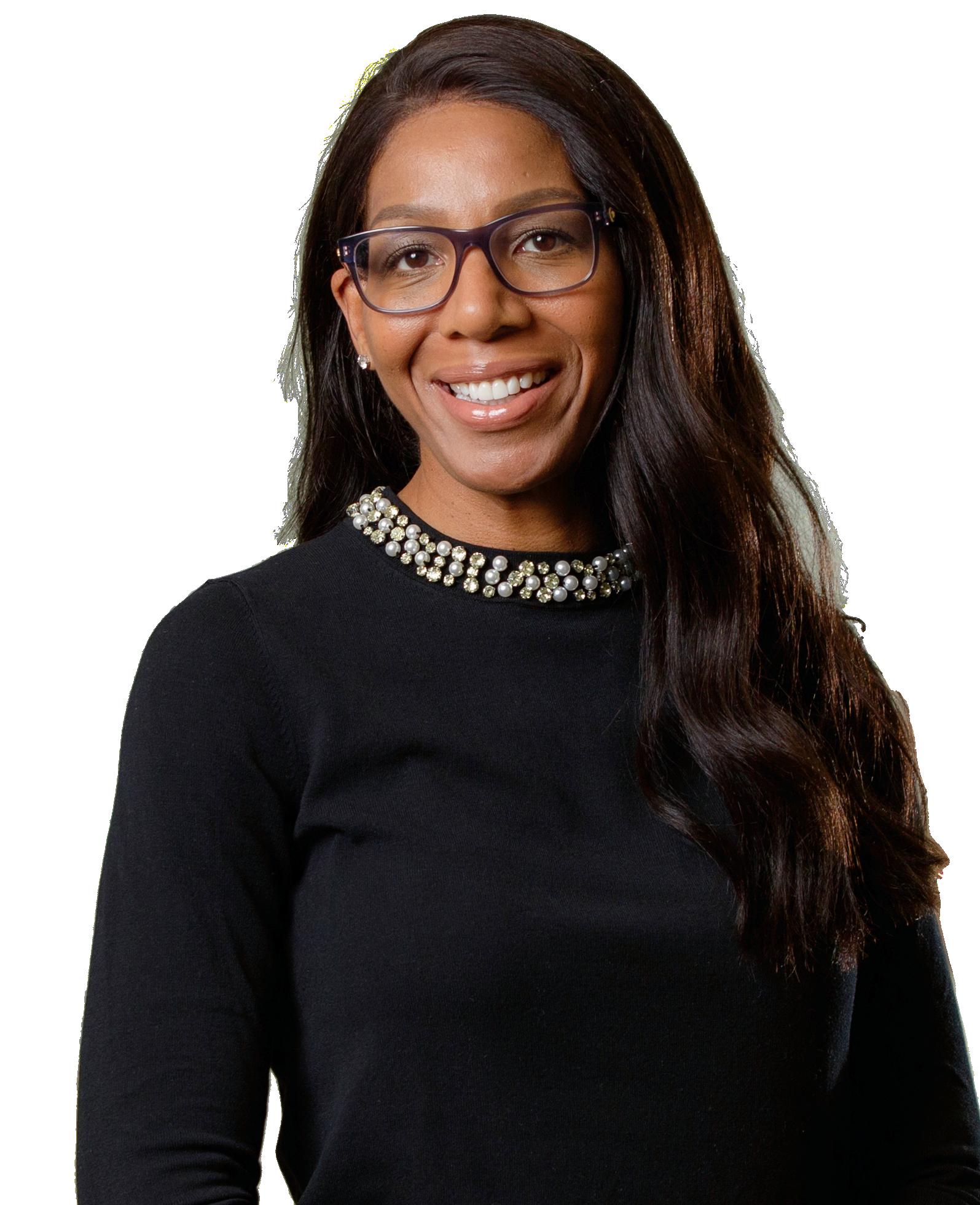
A year — and a great deal of progress — later, the physician executive says the health system marked another DEIB milestone: a record philanthropic investment supporting DEIB at Dartmouth Cancer Center.
In April 2023, Dartmouth Health received a $2.5-million gift from former Dartmouth-Hitchcock Trustee Barbara Couch and her husband, Dick Couch, to establish the Couch Endowed Fund for Inclusive Excellence Faculty Fellowships at Dartmouth Cancer Center.
The gift was amplified by matching funds from donor Dorothy M. Byrne’s gift that established the Byrne Family Cancer Research Institute. This brought the total endowment for Inclusive Excellence Faculty Fellowships to $5 million.
Malcolm says the donation, and Dartmouth Health’s attention to DEIB, will have a direct impact on patient care and outcomes.
“So DEIB in healthcare, it’s about having increased representation,” says Malcolm, a board-certified obstetrician-gynecologist.
“Providers who identify with and represent the full breadth of our patient population.” Studies show that when patients see themselves represented in their providers, it builds trust and leads to improved outcomes, she says.
“We want to deliver world class care. When I think about world class care, I think about care that’s culturally compassionate and culturally competent, that takes my whole being into account,” she says.
That cultural competence can be helped by having diverse teams who reflect the various communities they’re caring for and have an intuitive understanding of the issues they may be facing, including those that may not be obvious to a provider unfamiliar with a patient’s culture or community.
The gift from the Couch family directly impacts this goal.
“This is an opportunity for us to recruit more faculty from diverse backgrounds, and really put the research into how we’re delivering the care,” she says. “What are the treatment modalities? What are the plans we have now that we could redesign for them to be more equitable?”
She calls the donation, “a great coming together
of two passions from the Couch family, DEIB and cancer research. Hopefully one day it leads to the eradication of cancer.”
In the meantime, she’s driving to keep DEIB a key part of the Dartmouth Health culture. She says she’s seen wins.
“The fact that conversations about DEIB are happening spontaneously and organically is a huge accomplishment,” she says. “We just held our first community impact Social Justice Awards, and that stemmed from social justice and community engagement being part of our core DEIB principles.”
As an organization, we must take a strong stance,” she says. “Equity is a DEIB core principle that we uphold. And we believe in culturally competent care because it will improve the care we will deliver. It will improve the outcomes of our patients. Our employees will be able to give at a higher level because their talents and skills will be embraced.
“By developing an inclusive environment that represents the tapestry of the communities we serve, employees will feel more respected, more accepted, and therefore, will be more engaged. This leads to a better patient experience.” 603
Teresa
“DEIB in healthcare, it’s about having increased representation. Providers who identify with and represent the full breadth of our patient population.”
Dean Malcolm, Dartmouth Health’s first Vice President of DEIB (Diversity, Equity, Inclusion and Belonging), is leading the effort to infuse more DEIB throughout the health care system.
(Photo courtesy Dartmouth Health)
A Place to Call Home
AFGHAN FAMILY MAKES A NEW LIFE IN MANCHESTER
 n BY ROBERT COOK
n BY ROBERT COOK
When Zulmai Noorzaie, his wife, Zahra, and their six children arrived in Manchester in October 2021, the Afghan family felt delight, anxiety and pure culture shock.
Before they left their native country along with hundreds of other Afghan families to flee the Taliban, neither the couple or their children had ever been anywhere.
Thanks to a group of kind-hearted church volunteers, the family is enjoying their new Manchester home and new life in New Hampshire.
The couple’s eldest son, Ezatullah, 19, was one of his mother’s translators when 603 Diversity visited their home this spring. As tricky as it has been for his family to adjust to a new way of life, they are delighted to be here, he said.

“We are happy, because in Afghanistan there is no work and no school. Everything is destroyed,” said Ezatullah, who hopes to become a mechanical engineer.
Mike Mailloux, a volunteer with Brookside Congregational Church in Manchester, is one of several volunteers who have worked with Ezatullah’s family and many other Afghan families who have settled in the Queen City.
The family had to flee their home in Kandahar, because Zulmai would have faced the wrath of the Taliban, Mailloux said. But their journey to America and the life they lead now included several stops.
“They have been in New Hampshire since October 2021 and lived in a hotel on South Willow Street for five months. They also lived
in three military camps before they got here,” Mailloux said.
The main reason why the Nourzaie family had to flee Afghanistan was simple.
“My father worked with the U.S. soldiers and security,” Ezatullah says. His father had also worked with Canadian forces. Zahra shared copies of certificates of appreciation her husband received from the U.S. military for his service.
The U.S. pulled out of Afghanistan nearly 20 years after the beginning of war and the hunt for Osama bin Laden, the leader of Al Qaeda, the terrorist group that carried out the September 11, 2001, terrorist attacks.
Mailloux said that when the family learned the U.S. military was leaving Afghanistan in August 2021, they understood they would be airlifted to safety. Zulmai drove his family to
Kabul, where they boarded a U.S. Air Force C-130 cargo plane with hundreds of other Afghans.
As evidenced by news coverage, the scene at Bagram Air Base was chaotic, as Afghan civilians who had worked with the U.S. military scrambled to board aircraft to take them to safety.
According to the U.S. Department of Homeland Security, 3.2 million Afghan residents were displaced from their homes due to the U.S. military’s exit. Zulmai’s service allowed him to receive a Special Immigrant Visa, which gives those who were “faithful and valuable” to the U.S. government a path to permanent residency via a green card, according to the U.S. Citizenship and Immigration Services website.
They traveled to Qatar, then to Spain, and
603Diversity.com | Autumn 2023 25
Photos by Robert Ortiz
Ezatullah and Hekmatullah (opposite page) and their two brothers, Assadulah and Ahmadullah (above), are happy their family has found a new life in Manchester. But they also love their native country and hope to return and visit in the future when the situation in Afghanistan has improved.
then to Washington, D.C., before finally landing at a U.S. Army base in New Mexico. While there, Mailloux said Zahra learned to speak Dari or Persian to communicate with other Afghan families there. Zahra and her family are Pashto speakers. Overcoming an Afghan language barrier was the first of many adjustments to make. After a few months, the family flew back to Washington, D.C., before moving to Manchester.
The family works with the U.S. Committee for Refugees and Immigrants to resettle in America. The International Institute of New England’s Manchester chapter has partnered with Brookside church for many years to help refugees. The institute welcomes volunteers to help with apartment setup, transportation, English as a second language, grocery shopping and monetary donations.
Mailloux said church volunteers initially visited them daily.
According to Kristin Nealon, a church volunteer who teaches English as a second language, no one in the family could speak English when they arrived in New Hampshire. With her help, all six children — Ezatullah, his younger brothers, Hekmatullah, 17, Assadulah, 15, and Ahmadullah, 9, and their two sisters, Lema, 13, and Setara, 10 — now speak English.
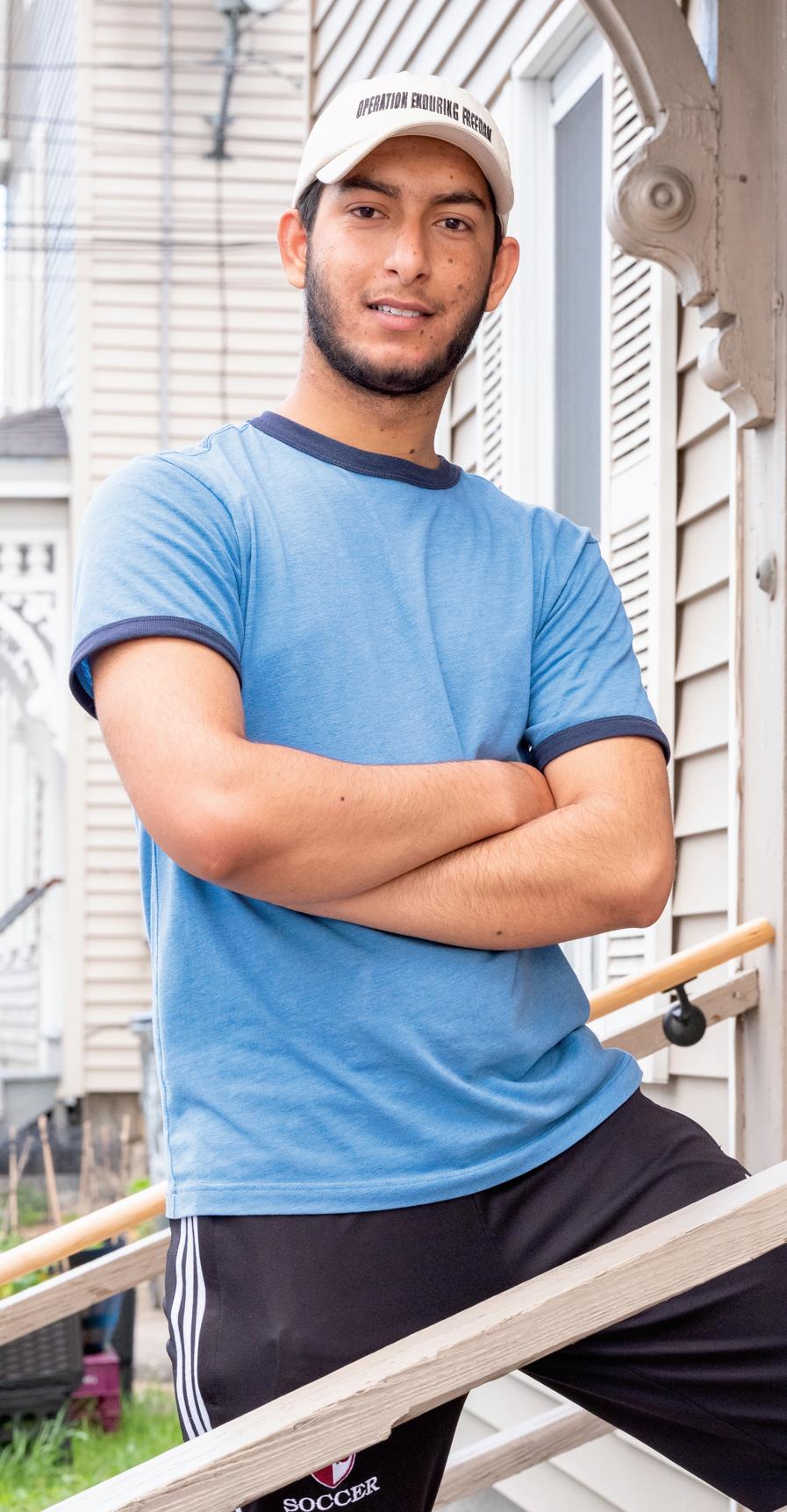
Church volunteers worked with city property managers to try to find apartments where Afghan families who became friends could live nearby.
Nealon said some families who lived in the same hotel before moving to their new homes became very close. She recalled there were at least two pregnant mothers. “There have been some babies and new Americans born in the last year and a half,” she said.
After finding the family a three-bedroom apartment, Mailloux said church volunteers gave them donated pots and pans, rugs, furniture and many other items for their new household — everything a family would need to live.
Inside their home, everyone takes off their shoes. Many of the rooms have Persian rugs on the floors. Bunk beds for the boys and the girls go unused, because Ezatullah says they prefer to sleep on the floor.
As she did at the family’s former home in Kandahar, Zahra bakes fresh bread each morning. She also makes her yogurt recipe for her family. The family prefers to go with native Afghan dishes whenever possible. Each day, they observe their Islamic faith by praying together in a room set aside for this sacred ritual.
The children are curious and excited to
learn new things. “School is fun. Summer is the best,” Setara said.
She just completed third grade and is looking forward to fourth grade in the fall. Setara has made new friends. She loves trying out new phrases that she learns from volunteers like Mailloux. “Get out of here!” Setara said repeatedly in jest.
When asked what she would like to do when she grows up, Setara replied, “I would like to be a teacher or a doctor.”
Assadullah, Ezatullah and Hekmatullah enjoy playing soccer. Assadullah and his younger sister, Lema, were scheduled to play a game. When asked to name the best soccer player in the family, Hekmatullah proudly proclaimed, “Assadullah!”
When asked what he would like to do someday, Hekmatullah replied, “I want to be a mechanical engineer,” like his older brother, Ezatullah.
Zahra said she is happy that her children will be able to get an education and have opportunities to pursue careers here. She needs help to get used to the digital world of using bank passwords, among other things.
Fortunately, her children are there to help her navigate technology and the language barrier. The children are very adept at using their smartphones. Like many teens, they enjoy following social media and watching videos.
The whole experience has been worthwhile, Zahra said. “It was the first time I left Afghanistan, and now I have a lot of friends here, and it is good.”
A large Afghan national flag hangs on the wall. As much as the brothers love the new country that has provided them with a new life, they also love their homeland.
“We love our country,” Hekmadullah said. One day, he says he and other family members may return to Afghanistan to visit family members who are still there.
Zahra is grateful that her family can stay together and feel safe as they continue to navigate their new lives in their new city.
“I like the place and I like the people,” she said. 603
26 603Diversity.com | Autumn 2023
Ezatullah, who hopes to become a mechanical engineer, says his family is delighted to be here. “We are happy, because in Afghanistan there is no work and no school. Everything is destroyed.”



603Diversity.com | Autumn 2023 27 We love insurance so you don’t have to. www.clarkinsurance.com
603 Diversity: News Briefs
Drag Queen Story Hour Draws Protesters and Supporters
Several dozen people stood outside the Conway Public Library in June to protest the Drag Queen Story Hour being held for an equal number of parents and children in the Ham Room as part of White Mountains Pride Month.
The group outside, many of whom attended recent library trustee meetings to protest a sex-education book they said was inappropriate, held signs and prayed. While some, like Tam Kelley of Bartlett and Nella Thompson of Eaton, were local to the valley, others, like Vincent Armstrong and Jeff Feller, were from Lancaster, where they successfully campaigned to keep the library in that city from holding a similar story hour.
They held signs that said: “I’m humbly proud to say that I am from Lancaster, NH, where we said “No!” to indoctrination and sexualization of our children, thanks be to God!”
Joining them was former state Rep. Norman Tregenz, R-Conway, who said the demon-
stration was “about protecting the innocence of children.”
Some in the group tried to attend the story hour, but White Mountains Pride President Chris Bellis and Library Director David Smolen said adults had to be accompanied by children. The protesters could be heard discussing whether to try to get in, but they decided to remain outside the building. Some spoke of possible court action over access to the library. “There were a lot of cameras and phone recording,” said Bellis, describing what protesters did.
Bellis said the program went well. “We were happy with the attendance, and we were happy that the kids had a great time. They enjoyed seeing a caterpillar become a butterfly and the stories that were read,” he said.
— DAYMOND STEET AND TERRY LEAVITT THE CONWAY DAILY SUN
Home for LGBTQ+ Teens to Open in Keene
A new group home in Keene for 14-to-18year-olds who identify as LGBTQ+ will open its doors Sept. 18, the Home for Little Wanderers of Boston announced in June.
Unity House, on Summer Street, will be the first of its kind in New Hampshire, offering a safe and supportive living environment with 24-hour staffing for up to eight youths, according to the organization.
The Home for Little Wanderers is the oldest child welfare agency in America, with more than 25 community and residential-based programs, per the news release. They include six youth residential care homes in New England — among them one in Waltham, Mass., that, like the new home in Keene, is designed for members of the LGBTQ+ community.
Residents of Unity House will have been placed in the custody of the New Hamp-
shire Division for Children, Youth and Families, according to draft minutes for the Keene Planning Board’s Oct. 24, 2022, meeting, during which the panel approved the site plan unanimously.
DCYF works to protect kids who may be victims of abuse or neglect, and receives more than 20,000 reports of suspected cases per year, its website states. If the division deems it necessary, it can ask a court to remove children from their home and place them in the state’s care.
Unity House will house LGBTQ+ youths while they prepare for family reunification, independent living and future self-sufficiency, according to the Home for Little Wanderers.
“Many youth at Unity House will have experienced difficulty — at home, school, within the community or in placement,” the
organization said in the news release. “This LGBTQ+ residential program will offer an array of educational, vocational and mental health services to support youth as they live, grow and build skills needed for the future.”
According to a 2022 survey of LGBTQ-identifying youth in New Hampshire conducted by the Trevor Project, 30% of respondents reported they had experienced threats or physical harm based on their sexual orientation or gender identity in the past year. Sixty-nine percent said they had experienced discrimination in 2022.
The nonprofit, which focuses on suicide prevention efforts for LGBTQ+ youth, also reported that 39% of respondents said they had seriously considered suicide in the past year, while 10% had attempted it. —
28 603Diversity.com | Autumn 2023
HUNTER OBERST THE KEENE SENTINEL
These articles were adapted from stories shared by and with partners in The Granite State News Collaborative as
603 NEWS
A journalistic look at our state of diversity from the reporters at the Granite State News Collaborative.
part of our race and equity project. For more information, visit collaborativenh.org.
Valuing diversity and inclusion
At NH Mutual Bancorp, diversity, equity and inclusion are at the core of who we are. We value the diverse and unique individuals who live and work in our communities, embrace all differences and strive to create a culture where everyone is welcomed and valued.


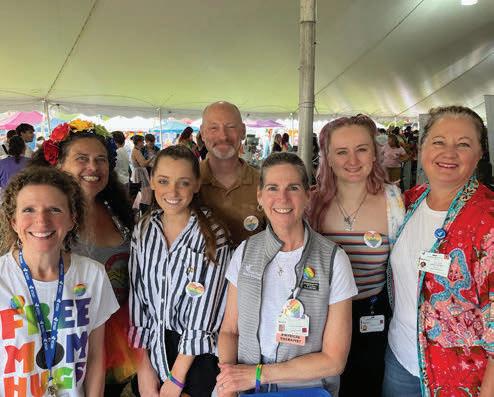
We are committed to dedicating our efforts; including leadership focus and investing our financial resources, to promote diversity, equality and inclusion across our work environment and within the communities we serve. Doing so, we believe, makes us a stronger, more successful and sustainable organization over the long-term.
https://www.nhmutual.com/careers/
At our core, we are caregivers who aspire to make our community a healthy and safe place for all who seek care from us, as well as for our staff. With our distinctive backgrounds, diverse races, ages, different sexual orientations, gender identities, and individual religious beliefs, we are dedicated to work together to care for everyone in our community. It is this mission that unites us as one.
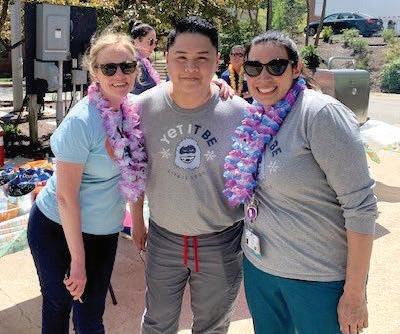
Join our team to make a difference!

ExeterCareers.com

603Diversity.com | Autumn 2023 29
Compassionate, caring, and innovative employees are what makes Exeter Health Resources a great place to work!
Manchester School Board Members Voice Support for West LGBTQ Pride Event
The Manchester Board of School Committee voiced support this spring for a recent LGBTQ pride event held at Manchester West High School.
Concern over the event was raised during the meeting’s public comment segment. A few residents, including Daniel Mowry of Ward 6, expressed disgust at the event, calling it a “drag queen show.”
Mowry, who identified himself as a gay man, said the event was inappropriate for schools and that LGBTQ Pride efforts are being forced upon people.
“We should educate students in civic pride, not gay pride,” he said.
Boatrd Member Ken Tassey Jr. said he was sympathetic to Mowry’s views. While Tassey said he was not at the West event, he felt that more deliberation in advance would have been appropriate, and he felt that an event promoting studying or opposing bully-
ing would have been more appropriate.
Ward 4 Board Member Leslie Want said the event was not a drag show but a young woman playing the piano and singing.
At-large Board Member Jim O’Connell, who also attended the event, described it as “uplifting.”
O’Connell noted that the event was organized by students and was held outside of school hours.
He compared it to a Christian prayer event organized by students at Central High School done outside of school hours.
Ward 11 Board Member Nicole Leapley also attended the event, which she praised.
“None of this is easy, but we’re all a community and we all care about each other, and we’re not going to single each other out for being different,” she said.
— ANDREW SYLVIA MANCHESTER INK LINK
Bedford’s History Includes the Story of Boston Bell
Bedford’s town history includes the story of Boston Bell, whio was enslaved by John Bell. John Bell arrived in New Hampshire from Scotland in 1739 in one of the early waves of immigrants fleeing religious persecution. John and his brother Joseph, a blacksmith, lived in District 5 of Bedford on what came to be known as “Bell Hill.”
Flora Bell, enslaved by Joseph, lived nearby on her own lot and gave birth to Ephraim “Boston” Bell in 1746. Boston became the “property” of John Bell.
In 1976, The New Hampshire Gazette listed Boston as a runaway, describing him as 20 years old, “stout and lusty.” History does not share the story of whether Boston returned home on his own. At some
Laconia Council Rains on Gay Pride Flag
There will be no rainbow flag flown from City Hall, nor will a flag supporting gay rights be flown from any city-owned flagpole this year, after the proposal failed to find City Council support.
The mayor’s advisory Human Relations Committee made the proposal, which was brought to the council in June by Councilor Tony Felch of Ward 6. Felch asked councilors to support a motion to fly a rainbow flag from the flagpole in the traffic island in front of the Congregational Church.
“So it’s not right here at City Hall, but it is flown by the city,” Felch said. “We flew it last year, we had no negative feedback. We had lots of positive feedback, actually.”
Public Works Director Wes Anderson noted if the flag is flown on the same pole as one also flying the American flag, he thought the Pride flag used last year would be too large.
City Councilors Henry Lipman, Robert Soucy, Mark Haynes and Bruce Cheney were silent when Mayor Andrew Hosmer asked if anyone would second the motion. Without a second, the motion failed.
point, however, he was back at Bell Hill. Joseph sold him in 1777 to Robert Wilson of Londonderry, a successful merchant, also of Scottish descent.
In 1781, it appears that Boston enlisted with the Massachusetts Third Regiment and gained the rank of private. Upon his discharge in 1786, he brought suit against Wilson, claiming in the Rockingham County Court of Common Pleas that Wilson had assaulted, imprisoned and restrained him of his liberty, selling him into the Army.
Boston lost the case. In 1790, he married Florissa Taggart Sherburn. They were able to live as free people in Londonderry.
However, the merits of a city-flown Pride flag came up both prior to and after Felch’s motion.
Pat Wood, speaking on behalf of the Human Relations Committee during public comments, emphasized the intrinsic value of each human being.
“When we forget that uniqueness, to think that everyone should be like us, then we tend to treat those other people as less important, less worthy of our respect, less worthy of our compassion,” Wood said.
Hosmer said he supported sending the policy to the Governmental Committee, saying clear guidelines would aid a future council to handle a potentially troublesome situation.
— ADAM DRAPCHO, THE LACONIA DAILY SUN
30 603Diversity.com | Autumn 2023
603 NEWS BRIEFS
— DEBORAH KNOWLTON, THE BLACK HERITAGE TRAIL
with the best
Whether you’re just starting out or have years of experience, the collaborative nature of nursing at CMC gives you the opportunity to make a meaningful difference, every day. We believe our nurses are among the brightest and most compassionate caregivers. Come be empowered to share your innovative ideas.

Join our nationally-recognized, award-winning team today!
CMCcareers.org/nursing
A CULTURE FOR ALLA Bank for Everyone
At Enterprise Bank, people and relationships come first. We encourage and foster a culture of diversity, equity, and inclusion, where everyone feels valued and respected. We are committed to a caring workplace that recognizes the importance of making a meaningful, positive difference in the lives of our team members, customers, and communities.
Inclusion is ingrained in Enterprise Bank’s DNA through its people-first philosophy and commitment to creating a workplace where everyone feels valued and respected. The Bank’s focus on diversity, equity, and inclusion is evident in our team members’ and leadership’s daily actions, coming from a place of empathy, compassion, and equal opportunity for all.
Jasmine Pandit Learning & Development Business Partner, AVP | Enterprise Banker since 2015
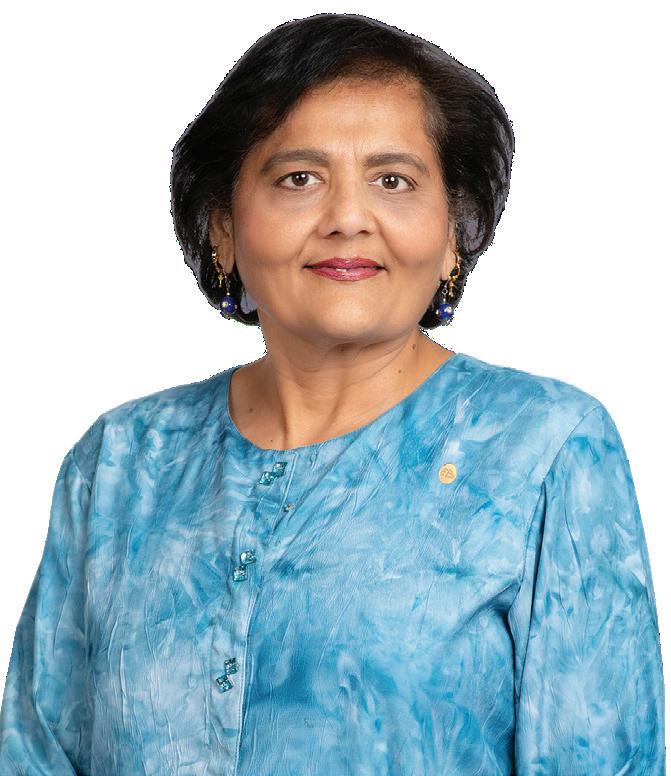
603Diversity.com | Autumn 2023 31 EnterpriseBanking.com/NewHampshire 877-671-2265
“ ”
Juneteenth 2023
A Celebration of Freedom and Joy
n BY ROBERT COOK / PHOTOS BY ROBERT ORTIZ
The second annual Juneteenth holiday on June 19 was preceded by a week of events, music, celebration and history in Portsmouth, which is in the midst of celebrating its 400th anniversary. Seacoast residents came out in force to honor the city’s African and African-American culture and history.

Two of these events, Chanting Down Babylon: Redemption Songs of the Diaspora reggae festival at Strawbery Banke on June 17 and the Healing of the Drums at the African Burying Ground on the holiday itself, celebrated the joy of the freedom and independence granted by President Abraham Lincoln and Congress with the Emancipation Proclamation in 1863 and the 13th Amendment in the U.S. Constitution that outlawed slavery in January 1865.
Juneteenth marks the day on June 19, 1865, when federal troops arrived in Galveston, Texas, and freed 250,000 slaves, the last slaves in the Union to be liberated. At the New Hope Baptist Church in Portsmouth where a special Juneteenth service was held on Sunday, June 18, Minister Sylvester Dye noted that Juneteenth is Independence Day for African Americans.
Robert Ortiz braved a wet, soggy and rainy afternoon to capture the reggae fest. His photos present a visual account of this city’s Juneteenth vibe.
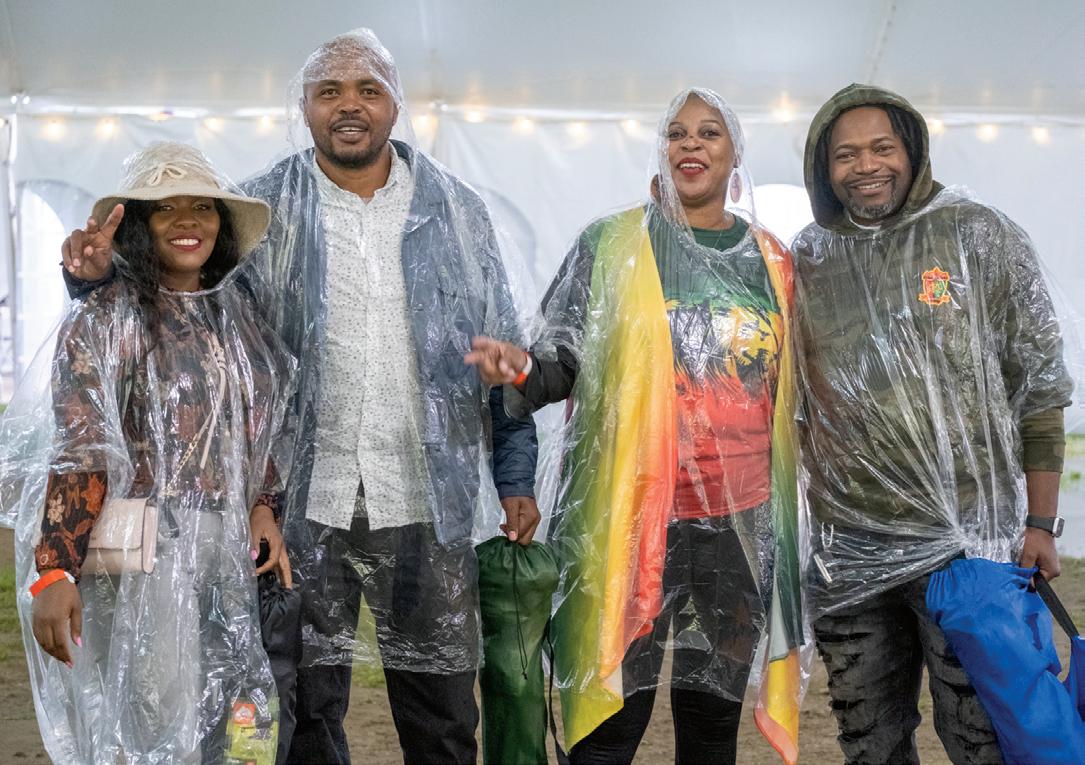
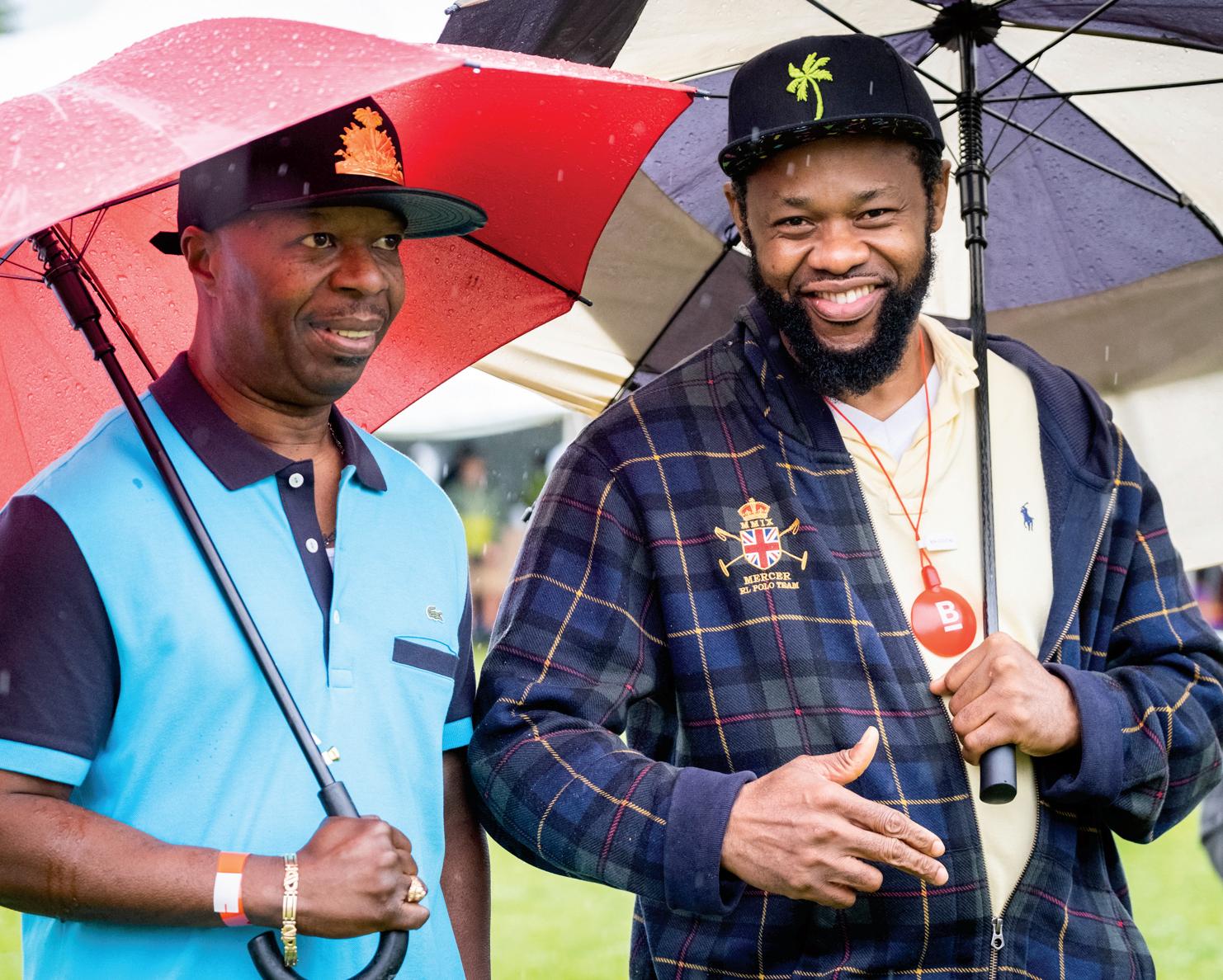
Among those who attended the Juneteenth Reggae Fest at Strawbery Bank were:
(1) JAH Spirit lead singer and guitarist, (2) Simson Jean-Bertrand and a friend from Boston, (3) Trevor Bryant and Avril Hazelwood, (4) Jacob Holmes and his boy, Kingston, of Exeter, (5) Alice Passer and Barry Krieger of Greenland, and
(6) Marlene and Kassie Viaud of the Haitian restaurant, AnswanM, in Milford.
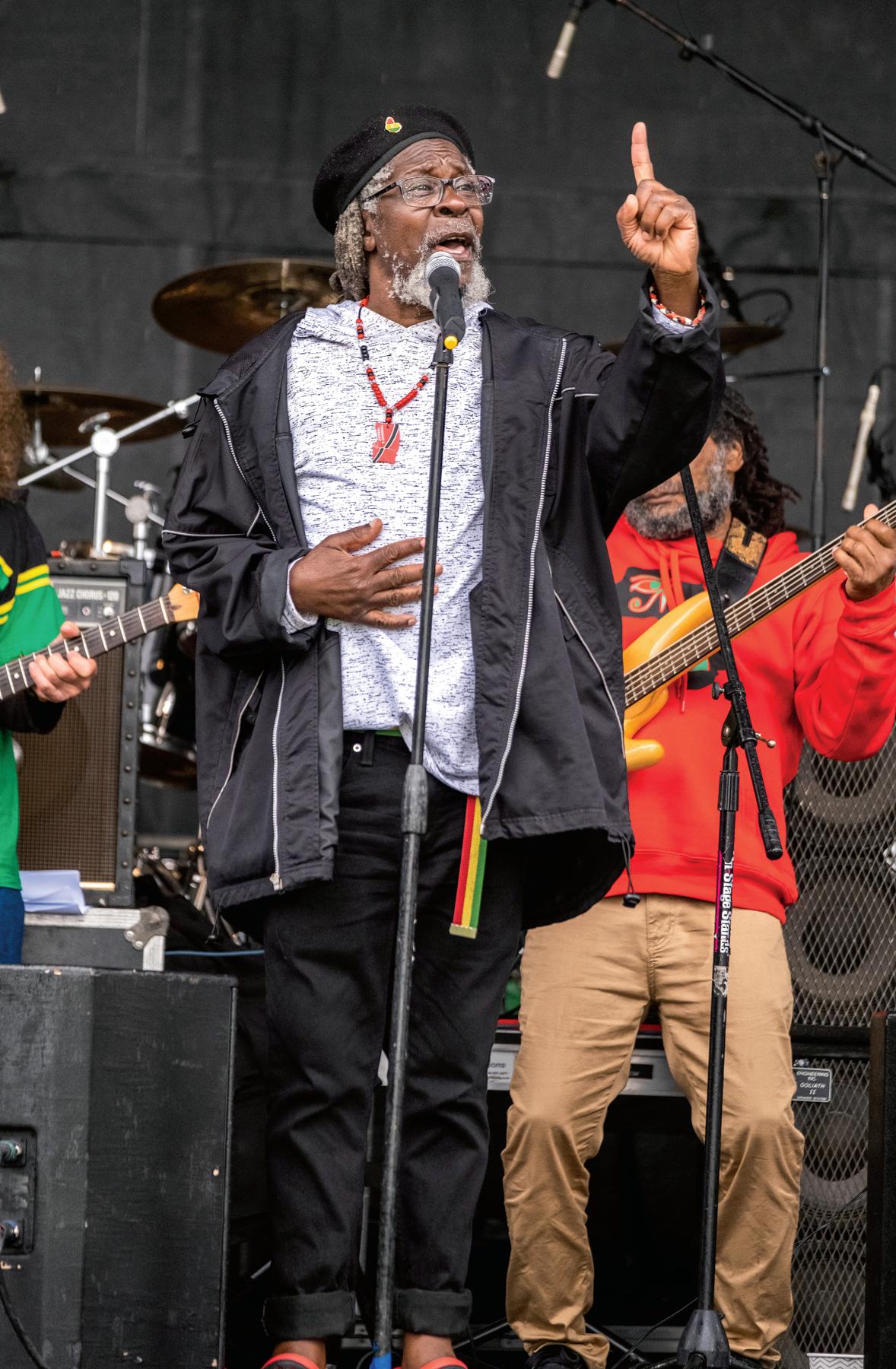
603 IN PICTURES
2 1





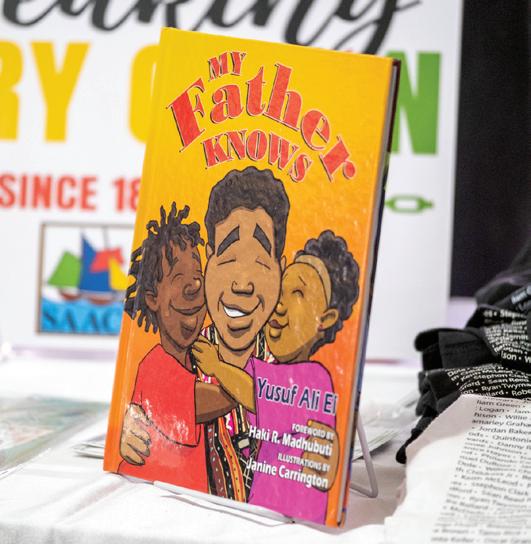
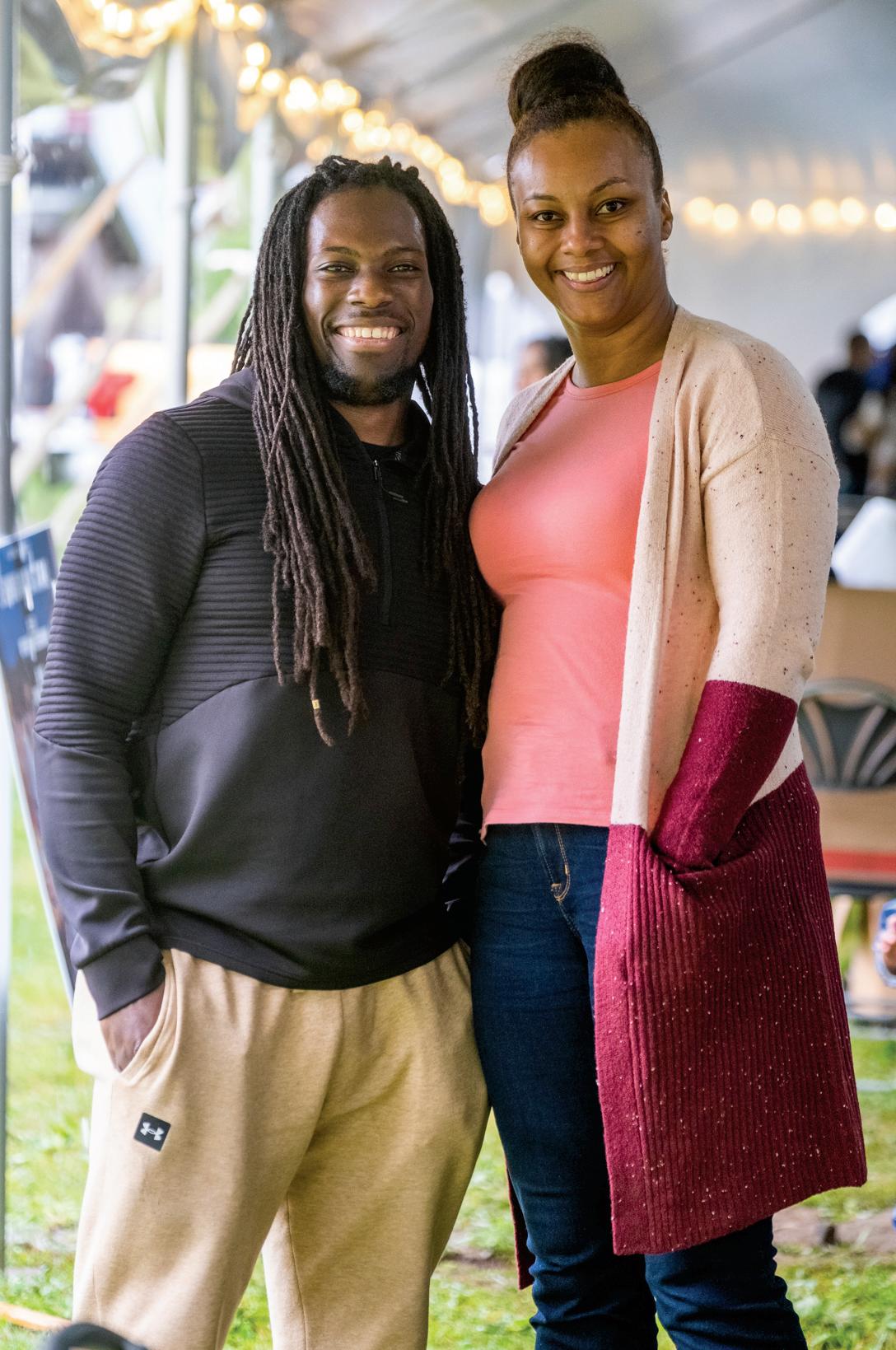

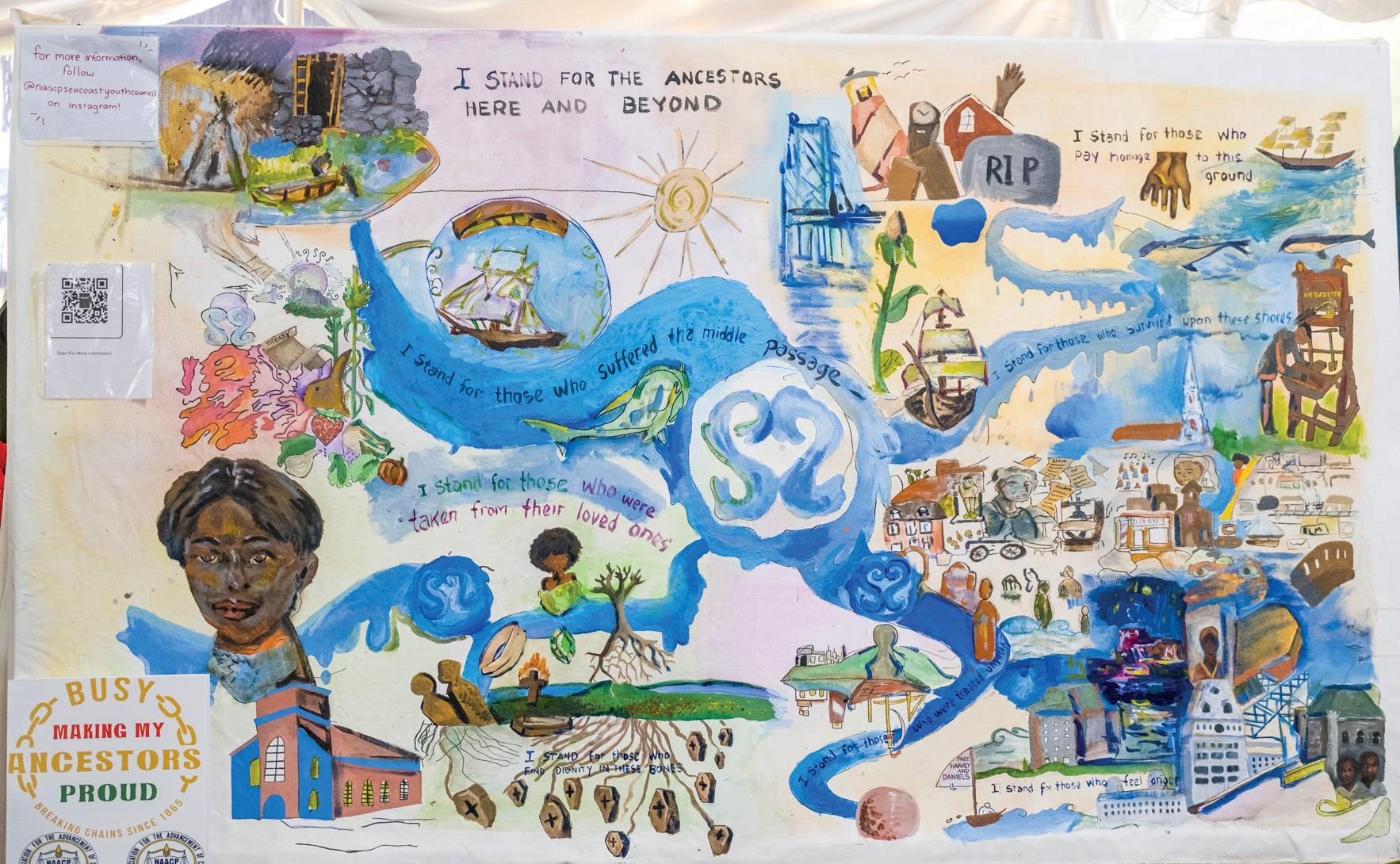
603Diversity.com | Autumn 2023 33 5
3
6 4
K-16 Public Education Must Embrace All Humanity
Igrew up circa 1980s-90s on Manchester’s West side, where I always lived close enough to walk to school. My French-Canadian parents adopted me from Korea, and I arrived on American soil sometime in 1977. Though my own mother never went to college, she dreamed of her children getting the chance she never did.
n BY TINA KIM PHILABOTTE
Ours was a home of love, and yet, I was raised to not see color. My parents let me know that I was loved just like my natural-born brothers. And they made sure I knew I was just like every other American girl — just as smart, maybe even smarter.
I tried to be the epitome of an American girl, but ultimately by high school, my grades slipped, my behaviors grew risky, and I failed every class during the fourth quarter of my senior year. I felt alone, numb, and I hated myself for not being able to deliver on the promise — whose promise I didn’t know. Manchester was just not equipped to embrace me in my full Korean-French-Canadian-adopted-awkward humanity.
Despite my lackluster high school performance, Plymouth State College accepted me. My first class was College Composition with Dr. Petersen and was known for being a lot of work. And though it was, we chose our own topics. We were allowed to use the word “I.”
We were taught that objectivity isn’t objective; instead, it was much more productive and authentic to name our biases and work hard to be mindful of when those biases influenced our perspectives. We were taught to see color.
Dr. Petersen pushed me to write about my lived experiences and use language to shape the “so-what factor.” Translation: “Why does this matter to you? Why should this matter to me?”
She pushed me to define the edges of the experience in a way only I knew. The more specific the detail, to take something we think we know, and make it new and original, ultimately is what will build connection with your reader. Illuminate the unseen and the invisible — that’s the job of the writer.
This practice pushed me to see myself. I wrote about how my third grade teacher threw markers at
me for winning the spelling bee. I wrote about times when people told me how I look like a little China doll, I smiled and let them touch my hair. I wrote about how I washed my elbows and knees crimson so I wouldn’t look so dirty. The writing was raw, painful yet exhilarating.
College helped me develop a learner mindset and gave me access to the skills and knowledge where I felt seen in the books I read and the issues discussed. The goal wasn’t to ace a test; the goal was learning.
Manchester today is the Manchester I wish I had. But in New Hampshire, we are currently managing the “Banned Concepts Law,” or what is formally known as “Right to Freedom from Discrimination in Public Workplaces and Education.”
“It bans advocating or teaching that certain groups of people are inherently racist, sexist or otherwise
oppressive, even if unconsciously,” according to NHPR’s Sarah Gibson. “And it also promotes teaching that people should treat others without regards to their differences. So, basically equal treatment of everyone, regardless of race, gender, disability, any other category.”
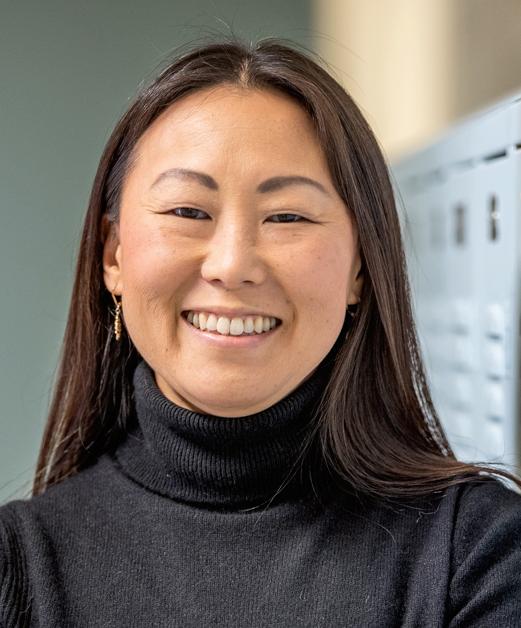
Gibson goes on to explain “that most of what’s been outlawed is not in curricula in New Hampshire now. Supporters of the law say it’s been creeping in. Critics of the law say it’s so vague that it will scare people away from having frank and very needed conversations about race, racism and discrimination.”
This law creates a cloud over developing that kind of connection for BIPOC and marginalized identities. In protest to this law and in my individual capacity as a diversity, equity, inclusion and justice (DEIJ) educator, I am a plaintiff in a lawsuit along with fellow DEIJ educator Andres Mejia working to abolish this ban.
We are represented by a diverse group of advocates from the American Civil Liberties Union, GLAD (a nonprofit that takes on legal issues for LGBTQ+
34 603Diversity.com | Autumn 2023 603 ESSAY
Courtesy photo
New Hampsire’s banned concepts law is a thinly veiled attempt to censor a truthful history.
people), the National Education Association — the largest teachers union in the state — and the American Federation of Teachers.
Together we argue that New Hampshire’s banned concepts law is a thinly veiled attempt to censor a truthful history and to punish teachers for ensuring students the very education myself and my classmates were denied 25 years ago.
Colleges and universities play an important role in this effort to ensure all students feel represented in the books they read and the issues they discuss. Higher ed has a long history of influencing K-12 education for the better. The dream of going to college definitely colored my K-12 experience.
In the 1990s, the SAT was the well-established deciding factor for whether you went to a “good school.” I took this test no less than four times in some form or fashion. Fast forward 25 years later and, by 2020, the racial awakening brought on by George Floyd and Breonna Taylor’s murders at the hands of the police, alongside the pandemic on Black and Brown communities, the public could not look away from the righteous protests initiated by BIPOC communities.
Social determinants of health, including race, socioeconomic status and housing instability, put front and center how institutionalized racism shows up within our housing, justice, health and education systems including higher education. Colleges and universities had to reckon with practices that were producing discriminatory outcomes, including the admissions process. As a result, the reign of the SAT began its downturn and rightfully so.
Today, post-George Floyd’s murder and post-Covid, policy is evolving. The SAT test has been exposed for contributing to discriminatory outcomes, as its origins are grounded in the racist construct of meritocracy. In 2020, the University of California system ended its 60-year use of the SAT admission requirement, and now over 80% of United States colleges and universities no longer require the SAT.
Because the focus is less on test scores,
more meaningful and intentional strategies that have the potential to yield equitable outcomes for BIPOC youth are being inno vated. In New Hampshire, Manchester Com munity College is co-creating high impact programs alongside the Manchester School District geared to support and welcome BIPOC youth.
The Composition 110X early college pilot engages MCC adjunct professors to be onsite through a dual college and high school enrollment program. MCC isn’t just throwing money at a “problem,” though the program is fully funded, MCC is working in collaboration with communities of color and the National Writing Project for meaningful outcomes.
This is what equity-in-action is all about: A collaboration that refuses to tell BIPOC communities what will fix them but instead supports conditions to engage BIPOC stakeholders in co-creating a solution. This partnership transforms College Comp from what was once known as a “gatekeeping” course often seen as a gauntlet to cull college-material candidates, to a “gateway” experience toward more equitable outcomes.
My college experience was transformational and ignited a passion for public education, but I acknowledge that my ability to attend college was connected to my proximity to whiteness, being East Asian, cisgendered, straight and able-bodied. One’s race, socioeconomic status, sexual orientation, gender or marginalized identity should not be a factor in college access, yet too many continue to experience barriers.
The aim of DEIJ is people-centered work designed to define the human experience. It is a culturally mindful practice where we think critically about what we think we know and what really is. Naming and understanding our own humanity and the humanity of those we say we want to have equity is what builds connection and community.
Ultimately, the collective work of public education, K-16 and beyond, is to understand the human experience by providing the skills and knowledge to make it mean something. 603
See Yourself
Learning, Training, Achieving... Becoming
Your journey begins here.
LNA Health Careers is here to make your aspirations a reality. Our programs are flexible and our community empowers you to grow, excel beyond the classroom, and make a significant impact in healthcare as you progress through your career.


LNA • MNA • LPN • Phlebotomy Tech
• EKG Tech • Pharmacy Tech • IV Therapy
Courses
The Y is for families
FAMILY MEMBERSHIP BENEFITS
At the Y, we recognize that no two families are alike. That’s why we redesigned our family memberships with new and improved benefits!
FAMILY MEMBERSHIPS ARE FOR 4 ADULTS* + 6 CHILDREN*
If you’re looking for a family-focused organization that values inclusivity, diversity, and empowerment, look no further! Discover all the ways we can help your family thrive at the Y.

*All members must reside in the same household.
www.graniteymca.org

603Diversity.com | Autumn 2023 35
• CPR/BLS Course • Refresher
Manchester, NH | Meredith, NH 603-647-2174 | lnahealthcareers.com
Attracting a Diverse Population
ACCESS TO HIGHER EDUCATION MUST IMPROVE
The World Population Review ranks New Hampshire as one of the most educated states in the United States. If those with some college and associate degrees are included, 66% of the total New Hampshire population has some sort of post-secondary education.
This has helped New Hampshire develop a diverse economy with companies willing to start and locate here and has helped the state compete regionally, nationally and internationally.
n BY WILL ARVELO
An educated workforce is one of the biggest, if not the biggest, strengths for the state. This high level of education also allows the state to maintain a diverse, engaged and balanced political culture, which supports and highlights the importance of New Hampshire’s first-in-the-nation-status.
These strengths will be tested in the coming decades as its workforce continues to age out and its native born have less children. According to the Carsey Institute of Public Policy, in 2020 the median age in New Hampshire was 43, making the state the second oldest after Maine. Also, according to the World Population Review, New Hampshire has the third largest (92%) White population in the country after Maine and Vermont.
Aging out of the workforce, and the trends of the young and native-born leaving the state and/ or choosing not to have children may lead one to think that New Hampshire may be on the decline, but this may not be the case. New Hampshire has always benefitted from in-migration. In the 1980s and 1990s, there was a significant in-migration from Massachusetts as families from that state sought a less expensive and higher quality of life tied to the natural ecosystem and recreational opportunities. While this trend continues, it has slowed significantly. Also, the patterns for in-migration are changing and highlight how the state is changing.
In particular, the growth in the Latino community and other non-White ethnic and racial groups is beginning to fill-in where mostly White Massachusetts residents left off. This shift will continue
to benefit New Hampshire in myriad ways, but it will also be a departure. The continuing growth and diversity of BIPOC (Black, Indigenous, and other People of Color) peoples will create more communities with cultural richness and complexity and, hopefully, more engaged citizens, and new entrepreneurs and business owners.
One potential benefit, as the population becomes more diverse, is that younger, native-born will decide to stay in the state. A survey done several years ago by Stay, Work, Play found that young New Hampshire residents sought more culturally diverse places to work and play. And we are making strides in that direction.
A study funded by the New Hampshire Democracy Fund titled “Latino Demographic Analysis and Trends,” found that while the general population
grew by 12% between 2000 thru 2021, the Latino population grew 194% from 20,489 to 60,323. By 2030, the Latino population of the state is expected to be at 80,000 and by 2040, at 100,000.
Just as important for the economy, the Latino median age is 29, much younger that the median age for White New Hampshire residents of 43. As this rapid growth continues, Latino and other BIPOC peoples will increasingly make up more of the New Hampshire workforce and become ever more important to New Hampshire’s economy.
Currently about 12% of the state’s population is made up of Black, Indigenous, and other People of Color (BIPOC). This population increased from 60,500 in 2000 to 176,880 in 2020 (Carsey Institute of Public Policy). A far cry from about 3% 20 years ago. As a consequence of this growth, I am now fortunate to have many BIPOC friends from the Caribbean, Latin America, Africa, Texas, Oklahoma, Georgia, Massachusetts, Maine and Connecticut.
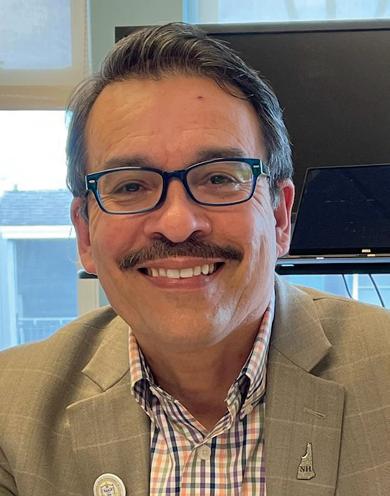
36 603Diversity.com | Autumn 2023
Courtesy photo
603 ESSAY
NH’s BIPOC communities have to ensure that access to a quality education is there for those that are here now and those that will be coming.
And best of all, they are here to make New Hampshire home for the long haul. Less and less do I hear newer BIPOC residents in the state say to me that they are thinking of leaving because there are no BIPOC communities or resources to serve their needs. Yes, we have a long way to go, but we have made significant strides in the right direction…all to the near and long-term benefit of the state.
While strides have been made across many private and public institutions around diversity, equity and inclusion, we know that BIPOC faculty and staff hired throughout K-16 are not finding the communities they need to thrive. New Hampshire’s higher education institutions are struggling to recruit and retain faculty of color and to start and sustain these critically important communities.
All institutions of higher education in New Hampshire have a moral and ethical obligation to do more. If they hire BIPOC faculty, then they have the responsibility to build a support infrastructure around these individuals as they on-board and work to retain them. Otherwise, they will have wasted much time and treasure to recruit faculty under false pretenses. It is one thing if the resources did not exist, but colleges have resources to move the needle on this.
What they do not have is the will and the passion to stay the course. Any college that surveys the New Hampshire landscape will quickly learn that there are now numerous new resources among the broader community for BIPOC faculty. Just recently I attended New Hampshire’s first Reggae Festival, which is indicative of a quickly changing landscape.
Organizations like the Black Heritage Trail, Business Alliance for People of Color, NAACP (Seacoast, Manchester, Nashua), Center for Justice and Equity,


Black Lives Matter, Stay, Work, Play, and many others are changing the landscape and colleges need to create bridges to these organizations to help build healthy communities of BIPOC faculty and staff. Institutions of higher education must do the work of engagement with this community. We are waiting at the ready.
Just as worrisome is the fact that sectors of the BIPOC community are not attaining higher education at the higher levels of the White population. As an example, about 30% of Latinos in New Hampshire have a bachelor’s degree compared to 40% for the non-Hispanic White population (New Hampshire Democracy Fund). If the state is going to maintain its economic competitiveness, it must ensure that this growing BIPOC population receives access to quality K-16 education.
New Hampshire’s BIPOC communities have to ensure that access to a quality education is there for those that are here now and those that will be coming. Your voice must be heard on this. Just as K-16 has an obligation to reach out to our communities, we have an obligation to build bridges as well. If we do this, collectively, we have an opportunity to build more equitable K-16 educational pathways that will benefit all of New Hampshire’s citizens.
As we challenge the status quo for more justice, equity, and access, our poor White communities that have been historically left out will also benefit. The BIPOC community has the leadership and an obligation to engage and push for change.
The success of our youth, vibrancy, and health of all our communities, and competence for our workforce and economy are all riding on our ability to see this and use it to create positive change. Let us not miss this opportunity. 603
603Diversity.com | Autumn 2023 37
NH’s Path to an Inclusive Society
IT BEGINS WITH HIGHER EDUCATION FOR ALL RESIDENTS
New Hampshire is a state that has historically been predominantly white, rural and conservative. However, in recent years, the state has experienced significant demographic changes that have increased its racial, ethnic, cultural and linguistic diversity.
 n BY JAMES MCKIM
n BY JAMES MCKIM
According to the Department of Education, students of color comprised 15.8% of all public-school students in New Hampshire in 2019-2020, up from 10.5% in 2010-2011. Having several refuge cities, the state has seen an influx of immigrants and refugees from various countries, such as Sudan, Bhutan, Somalia and Congo. These changes pose both opportunities and challenges for the state’s society and economy, as well as for its higher education system.
In “The Sum of Us,” Heather McGhee describes how embracing diversity can make a community better and stronger. Higher education can help society in New Hampshire become better and stronger as it becomes more diverse by fostering an environment of inclusive excellence.
sibility. This leads to a more inclusive, tolerant and democratic society that respects and values the diversity of its people.
Hopefully, we all want a society where there is recognition and respect of diversity — different identities, backgrounds and perspectives, and the promotion of equal access and opportunity for all. This is what DEI is all about. Higher education can help achieve such a society by creating an environment where students, faculty and staff can thrive and contribute to the common good.
By exposing students to the presence and interaction with people with different backgrounds, perspectives, experiences and identities in the learning environment, higher education can enhance students’ academic and personal growth improving their cognitive skills, social skills, cultural competence and civic engagement.
Studies have shown that students who learn in diverse environments tend to show improvements in several areas:
Cognitive skills: They perform better academically, because they are exposed to different viewpoints, arguments, evidence and methods that challenge their assumptions and stimulate their curiosity.
Social skills: They develop better social skills, because they have more opportunities to collaborate, cooperate, negotiate, empathize and resolve conflicts with people from different backgrounds and cultures.
Cultural competence: They develop higher levels of cultural competence, because they gain more knowledge, awareness and appreciation of different cultures and their histories, values, beliefs and practices.
Inclusive excellence is a concept that recognizes that diversity, equity, accessibility and inclusion (DEI) are foundational values that are inextricably linked to achieving academic excellence and social respon-
Civic engagement: They develop higher levels of civic engagement, because they become more aware of social problems and injustices, more committed to social responsibility and action, and more confident in their ability to make a difference.
These skills will help prepare students for entry into the workforce and citizenship in a multicultural and globalized real world, where they will encoun-
38 603Diversity.com | Autumn 2023 603 ESSAY
Courtesy photo
By exposing students to the presence and interaction with people with different backgrounds, perspectives, experiences and identities in the learning environment, higher education can enhance students’ academic and personal growth improving their cognitive skills, social skills, cultural competence and civic engagement.
ter people from various races, ethnicities, cultures, religions and backgrounds.
Workforce: Higher education institutions can implement policies and practices that promote equity and inclusion in admissions, financial aid, scholarships, academic support services, mentoring programs and career guidance.
Citizenship: Higher education can empower leadership and civic engagement through support of student organizations, initiatives and movements that advocate for the rights of diverse people.
In addition to preparing students, higher education can help society in New Hampshire as it becomes more diverse by supporting faculty and staff diversity and development. Faculty and staff who have the quality, climate and engagement that diversity and development supports can provide better education for students,
create a more inclusive environment for themselves and others, and produce more innovative research and scholarship for the state and the world.
This can be critical in helping students from underrepresented groups who may face barriers or challenges in their academic journeys and keep quality faculty and staff who are members of the community: New Hampshire’s society.
Higher education also can help society in New Hampshire as it becomes more diverse by engaging with the community and stakeholders. This can increase the access, outreach, impact or accountability of higher education. In this sense, higher education becomes a training ground and an exemplar for how society should look and behave.
Higher education plays a pivotal role in shaping individuals and society as a whole. In New Hampshire, a state known for its
picturesque landscapes and strong sense of community, the importance of higher education cannot be overstated.
By embracing the transformative power of higher education living into DEI — which is the recognition and respect of different identities, backgrounds and perspectives, and the promotion of equal access and opportunity for all — not only does higher education provide individuals with knowledge and skills, but it also serves as a catalyst for a better society.
Through fostering awareness and understanding across difference, it will help everyone enjoy higher income, better health, more job opportunities, job security and personal development.
This will make New Hampshire a more inclusive society, fostering economic growth, social progress — and a brighter future for all its residents. 603
Fraud Prevention
AARP Fraud Watch Network® helps you recognize online shopping scams, so your money, health and happiness live longer. The younger you are, the more you need AARP. Learn more at aarp.org/fraudwatchnetwork
/AARPNH @AARPNH
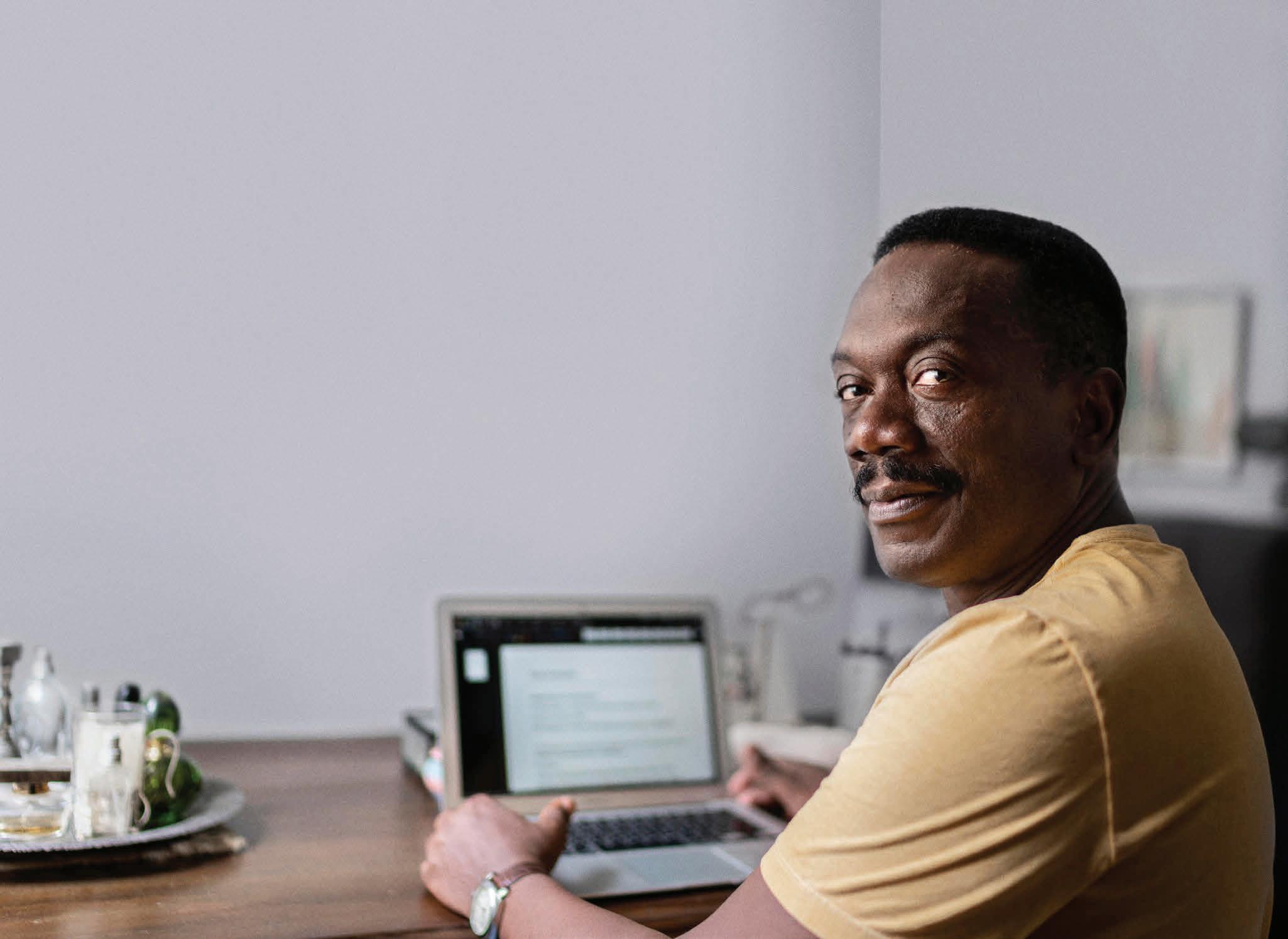
603Diversity.com | Autumn 2023 39
I was hunting for deals. What I found was fraud.
603 MARKETPLACE
Sanborn Solutions is your go-to source for LGBTQ+ diversity and inclusion support. Through training and consulting, we can help your organization enhance its LGBTQ+ cultural competency and best practices.

Sanborn Diversity Training Solutions
www.sanbornsolutionsllc.com
(603) 434-0068
Do you give a damn about the well-being of your workforce? Chewlin Group helps your organization build a culture of well-being to reduce stress, prevent burnout and return to joy.
Diversity Outreach Services offers personalized Direct Support Professional Services, promoting individuality, well-being, community involvement and career/educational exploration. DOS believes in you — supporting all ages and abilities.

Donna Quinn Corriveau
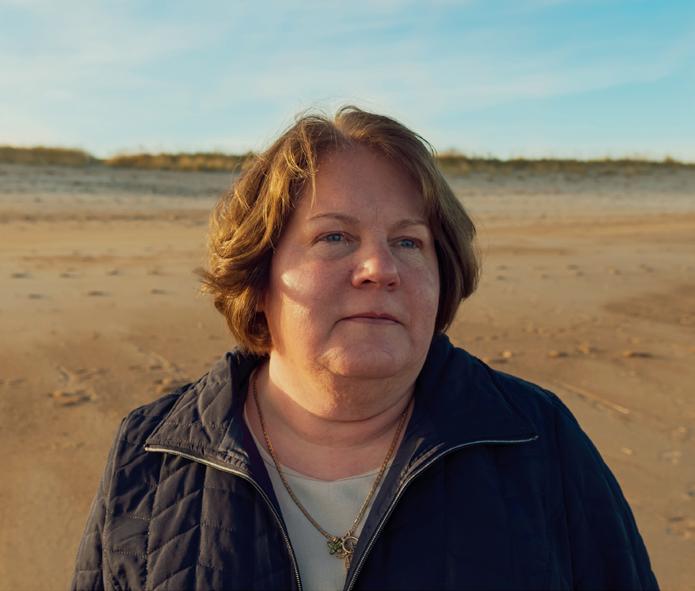
Direct Support Professional (603) 401-8489
contact@dosnh.org
www.dosnh.org
Founder
Chewlin Group (603) 809-5089
jennice@chewlingroup.com
www.chewlingroup.com

Drinkwater Marketing develops strategies to put fundamental knowledge and experience behind your brand, widening your inclusive reach. Consumers are increasingly socially conscious and many expect organizations to reflect their values. That’s where we come in. We provide expert insight and best practices to help build the inclusive brand that you need to thrive. We’re here to help your leadership, business development and product teams understand current DEI strategies and best practices.
Drinkwater Marketing
www.drinkwatermarketing.com
(888) 936-4970
You can rely on Edward Jones for one-on-one attention, our quality-focused investment philosophy and straight talk about your financial needs. To learn more, call today.
Andrea Williamson, Financial Advisor

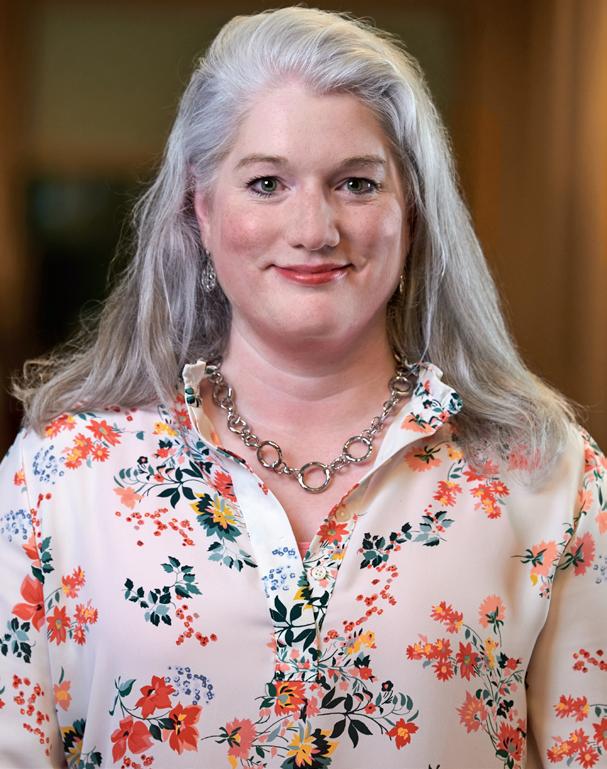

www.edwardjones.com/us-en/ andreawilliamson (207) 967-3585
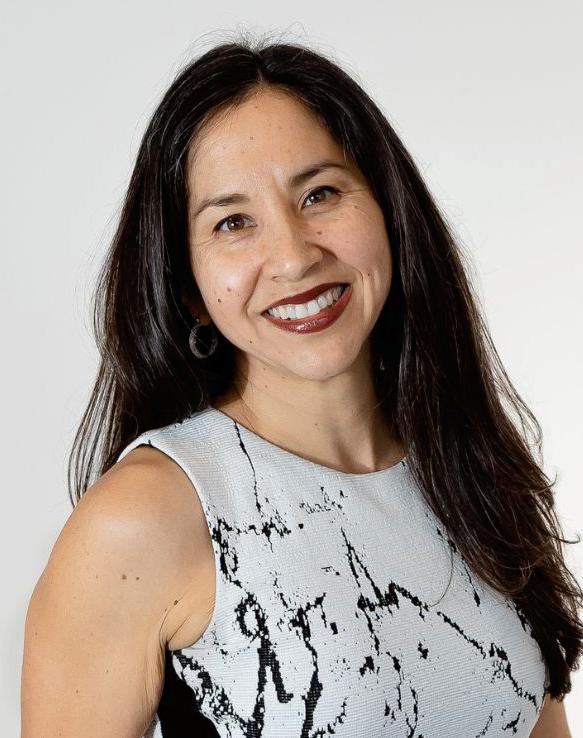
40 603Diversity.com | Autumn 2023
Jennice Chewlin, MPH, CHES® CEO &
MKT-1952G-A
edwardjones.com Member SIPC









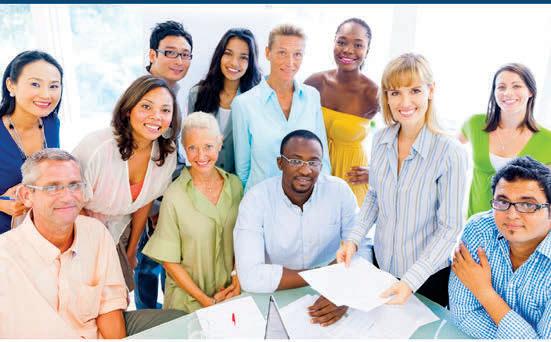
603Diversity.com | Autumn 2023 41 Learn more at McLane.com/Mansfield COMMITTED TO DIVERSITY, EQUITY & INCLUSION A central part of McLane Middleton’s statement of core values is our commitment to diversity, equity & inclusion. It’s what we believe in. As part of that commitment, we’re proud to announce that we’re participating in the Mansfield Rule certification process; a national initiative aimed at closing the diversity gap in the legal profession. Meet ExpertstheA Q&A with local industry pro NEW HAMPSHIRE MAGAZINE SPRING/SUMMER 2023 DISPLAY UNTIL 3, 2023 603 DIVERSITY CONVERSATIONS WITH ROBB CURRY A NEW DIRECTION FOR KIMBALL JENKINS INTERNATIONALLY TRAINED NURSES Q2 2022 Connecting with the out oors A SEABROOK STUNNER FIRE UP THE GRILL • COZY LAKE COTTAGE NEW HAMPSHIRE HOME JULY AUGUST 2023 THE LAKES AND SEACOAST ISSUE The Lakes and Seacoast Issue Live Free. NEW HAMPSHIRE MAGAZINE JULY 2023 BEST OF NH A MUSICAL TREK TO JERRY JAM SUMMER THEATER RETURNS TO NH VISIT CUT-FLOWER FARM Musical Trek to Jerry Jam Real Bars You Can Really Love Summer Theater Returns Best Burgers, Beer, Diner, Cocktails, Ice Cream, Shops and Services, Tacos, Chicken Tenders, Museum, Antique Shop, Florist & More! The JULY2023 $5.99 nhmagazine.com ONLINE @ NHBR.COM JUNE 16 29, 2023 VOL. 45 • NO. 12 $1.75 BY PAUL BRIAND If economist Brian Gottlob were grading on a curve comparing New Hampshire to other states, he’d give the state’s economy at midyear a solid A. “We’ve really faced the headwinds better than most states,” he said. “We really haven’t been deterred, given all the things that are happening nationally.” That said, when Gottlob — who’s direcand manufacturing — shows general positivity, especially in how the state has rebounded from the shut-in days of the Covid-19 pandemic. But … workforce issues, housing availability and affordability, inflation and the spillover effects of national and international concerns add a chorus of caution to the songs of praise as the state’s economy moves through the second half A hole in Manchester’s arts community Versatile leaders: a valuable resource NH man in PPP fraud has regrets — up to a point In interview, Joshua Leavitt puts most blame on his partner BY BOB SANDERS Before Joshua Leavitt started his 28-month sentence in federal prison in Lewisburg, Pa., for fraudulently obtaining pandemic relief funds, the self-described serial entrepreneur had few things to say. “I knew inflated payroll a bit to keep the existing companies going,” he said. “However, it feels more than a little unbalanced to make me the poster child … when the government admits on its own to hundreds of billions of dollars in known losses to China alone.” Leavitt, of Northwood, pleaded guilty last July for fraudulently taking $873,475.50 in Paycheck Protection Program and Economic Injury Disaster Loan (EIDL) funds, along with his partner, Pierre Rogers, who was earlier sentenced PAGE 12 PAGE 14 FEATURED INTERVIEW Q&A: School psychologist Nate Jones PAGE 31 (Photo by Marco Verch via flicker) New Hampshire nonprofits see charitable gaming as a big-dollar fundraising tool PAGE 8 Gains of chance ‘We’re back to normal’ At midyear, NH economy is strong, but concerns persist NEW HAMPSHIRE GROUP 100% Employee-Owned Subscribe or advertise: nhbr.com nhmagazine.com nhhomemagazine.com 603diversity.com bridenh.com WE ARE The mission of the Manchester Branch of the NAACP is to secure political, educational, social, and economic equality of rights for individuals and black businesses. naacpmanchesternh.com @NAACPManchester2069 @NAACPManchesterNH @ManchesterNAACP
Events
THAT MAKE A DIFFERENCE
AUGUST 5 AND SEPTEMBER 2
Gender Blenders Exhibits in Manchester
Hop Knot, Kenny Frasch and House of Marvel, Manchester’s activist and empowerment Drag House, will continue to host Gender Blenders, which are exhibitions of various performers breaking ground on identity. Both events will take place on Aug. 5 and Sept. 2, at 10 p.m. 21+, No cover charge.

Kimball Jenkins Happenings
AUGUST 17
MyTurn Summer internship and mural unveiling led by Richard Haynes, Yasamin Safarzadeh, Amber Nicole Cannan and Jozimar Matimano will be Aug. 17 at West High School in Manchester.

NOW THROUGH SEPTEMBER 14
Chef’s Kiss; Contemporary Mastery in New Hampshire. View through Sept. 14.
SEPTEMBER 21
Dirt Matters: Climate Action Art Reception will be held on Sept. 21 from 6 to 8 p.m. in partnership with Nature Conservancy. As an echoing of an award-winning internship with MyTurn, Kimball Jenkins and The Nature Conservancy will exhibit local art and artists whose impetus of creation encapsulates the idea of stewardship and harmony with our surroundings.
Look out for a secret mural unveiling at Waypoint’s Youth Shelter in Manchester sometime in late September!
COMING IN SEPTEMBER
To submit multicultural or changemaker events for the next issue, send them to editors@603diversity.com.
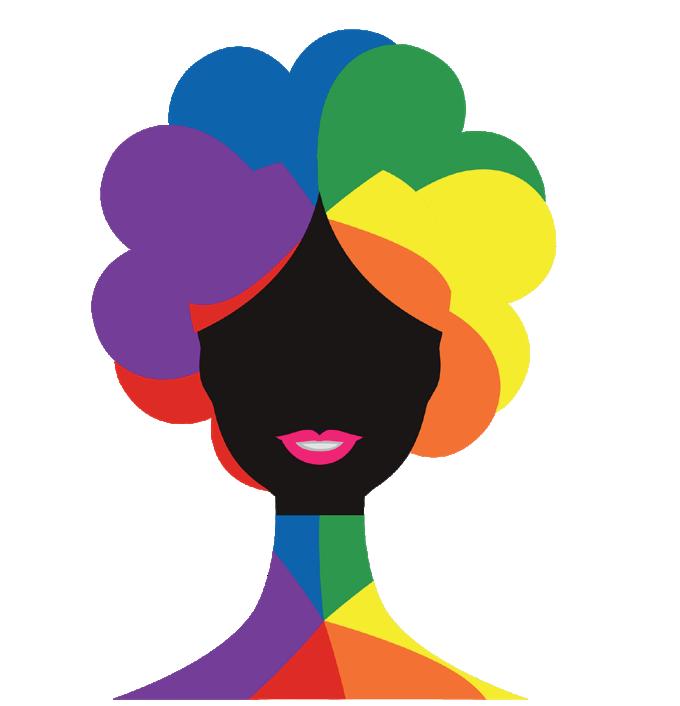 COMPILED
COMPILED
BY
YASAMIN SAFARZADEH / COURTESY PHOTOS
AUGUST 24
Queerlective Exhibit at the Currier
Queerlective is turning the Currier into a backdrop for queer and BIPOC fashion. Join us Aug. 24 as we celebrate diverse fashion during the Currier’s Art After Work event. This event will feature drag performers, local fashion artists, and a runway for designers and the community. The event will culminate in a free photoshoot for participants using the most picturesque spots in the museum as a backdrop.
Journee La Fond Exhibit
Coming to Portsmouth
Planned Parenthood and prolific performer, artist, curator and activist Journee LaFond will create an all-inclusive and empowering event at 3S Artspace in Portsmouth this September. Follow Journee on Instagram @OnyxReigns for drag stuffs, @capitalcitypridenh for Pride stuffs all throughout the region well into July and August, and @Journeethelifedoula for September and October events!
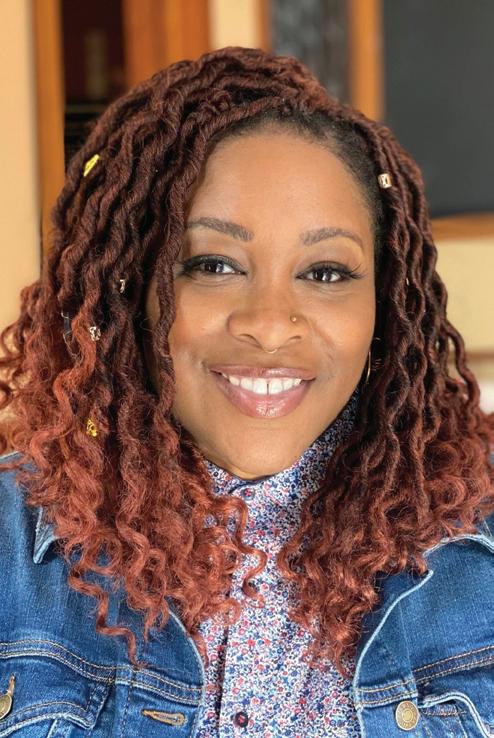
42 603Diversity.com | Autumn 2023 603 HAPPENINGS
THROUGH SEPTEMBER 15
NH Photo Exhibit in Concord
Becky Field, a New Hampshire icon, will have her photography of New Hampshire’s diverse landscape on view at Concord Public Library and the City Wide Community Center through Sept. 15.
AUGUST 19 We Are One Festival

The We Are One Music/ Culture Festival returns Aug. 19 from 11 a.m. to 6 p.m. at Veterans Memorial Park, 723 Elm St., Manchester. The gathering brings together the oldest Latino & African-centered cultural festivals in New Hampshire into one event. Latinos Unidos established the Latino Festival in 2000, and Ujima Collective founded the African/Caribbean Celebration in 2001 to address issues of social isolation and cultural alienation. “We combine our efforts to celebrate our unique ancestry, common cultural heritage, and our shared interests because we are ‘Better Together,’” organizers said at welcomingnh.org.
SEPTEMBER 16 AND 21
“Love and Resistance” Poetry and Conversation Series

NH Panthers has secured funding and coordinated, alongside Portsmouth Poet Laureate Diannely Antigua, a most exciting symposium, “Love & Resistance: A Poetry & Conversation Series.”
On Saturday, Sept. 16 at 7:30 p.m. on the patio of Vida Cantina in Portsmouth will be a “delicious and immersive evening of poetry, music and conversation: “Love & Resistance: A Poetry & Conversation Series, Latinx Voices.”
The following Thursday, Sept. 21 at 7 p.m., the Nashua Public Library will host, “Love & Resistance: A Poetry & Conversation Series, Black Voices.” This event will feature selections by BIPOC writers touching on the themes of love and resistance, with discussion on the intersections of poetry, activism and personal experience.
Look forward to future events. with themes like queer voices, harm reduction mental health and more!
Contact nhpantherteam@gmail.com or 503-975-9558 for more information.
SEPTEMBER 24
Concord Multicultural Festival Returns
Concord Multicultural Festival is an annual event in September celebrating the region’s diverse communities. The event will be held at Keach Park, which houses an amazing mural by Jozimar Matimano and will feature foods, performances, art, youth and adult activities and a parade of flags. Join community members in learning about each other’s cultural and multicultural backgrounds. On Sunday, Sept. 24 from 11 a.m. to 4 p.m. Visit concordnhmulticulturalfestival.org for more information, email connect@concordnhmulticulturalfestival.org or call 603-568-5740 for more details.

603Diversity.com | Autumn 2023 43
A Brotherhood of Song
NH GAY MEN’S CHORUS MARKS 25 YEARS
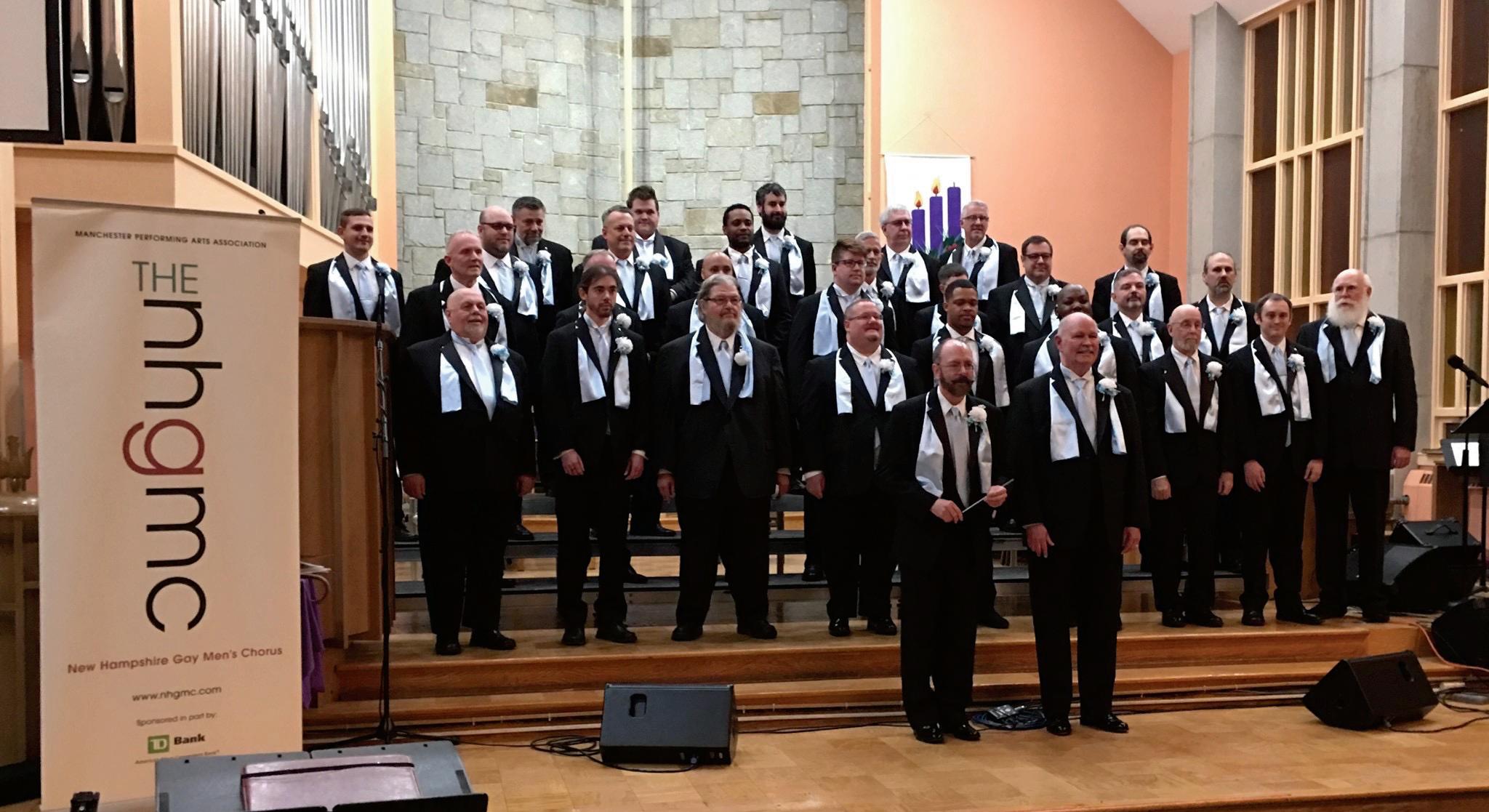 n BY ROBERT COOK
n BY ROBERT COOK
Steve Valido smiles when he talks about the New Hampshire Gay Men’s Chorus’s most recent performance at Fenway Park. The Boston Red Sox invited Valido and more than 25 other members to perform before a June game during Gay Pride Week.
As one of the members who joined the chorus at its founding in 1998 in Manchester, Validoa appreciates its significance.
“We’ve come a long way,” he says. “But we still have a way to go, even today.”
President John McGeehan recalled how many men didn’t want their names printed on a concert program or wore sunglasses to partially conceal their identity for fear of how being gay would be received at work or in the community.
The group marked its 25th anniversary with a series of Silver Season of Love spring concerts performed at venues in Manchester, Newington, Nashua, Jaffrey, Plymouth, and for the first time, at the Barnstormers Theatre in Tamworth.
“We do operate openly as NHGMC now, and our sponsors are very supportive of what we do,” McGeehan says.
Gov. Chris Sununu noted the chorus is “truly a Granite State musical treasure” in his 25th anniversary commendation.
Artistic Director Luc Andre Roberge says
he is delighted that chorus members can be open and proud of who they are whenever they take the stage.
“That those of us who have been around such as Steven, who was one of the very original members, it is outstanding. It is just unbelievable that we can do what we do today and not have to worry about who knows,” Roberge says.
McGeehan said the musical numbers they performed during their 25th anniversary shows were complex, because they covered a wide range of topics and events over that span.
“The theme of brotherhood shone through,” Roberge says. “We were trying to give people a taste of what it has been like in this organization for the last 25 years.”
Chorus Secretary Rob Marino said one song remembered the murder of Matthew Shepherd, a University of Wyoming student who was beaten, tortured and left to die near Laramie on Oct. 6, 1998. Shepherd died six days later. Two men were later arrested and charged with first-degree murder, and Shepherd’s murder received widespread media coverage.
They also performed an Armed Services melody encompassing the military’s previous “Don’t Ask, Don’t Tell” policy, which ended in 2011, and honored LGBTQ mili-
tary members for their bravery and service to their country. Other songs were devoted to gay marriage, which became law in New Hampshire on Jan 1, 2010.
Despite any opposition they may encounter, Roberge emphasizes the strong bond shared by the past and present members of the chorus. “I think that was very important for us to be a strong brotherhood and be a strong organization for the gentlemen who sing with us or have sung with us,” he says.
The NH Gay Men’s Chorus was created by Richard Bojko, the late David R. Snelson, and the late David Swart after they had attended a Boston Gay Men’s Chorus holiday concert in 1997. They asked themselves, “Why can’t we do this in New Hampshire?”
Following initial calls for members and rehearsals, the chorus performed for the first time on June 20, 1998, at Manchester’s Veterans Park during the second New Hampshire Pride Festival. The future looks bright for the NH Gay Men’s Chorus as they hope to play more venues and welcome new members.
“We are not going anywhere. Over the past few years, we have had unprecedented popularity around the state,” McGeehan says. 603
44 603Diversity.com | Autumn 2023
603 SHOUT OUT
Courtesy photo



We offer $10,000 in downpayment assistance to qualified borrowers. That’s how we make homeownership happen. Find out if you qualify. Homeownership is $10,000 closer than you think. Find an approved lender at NHHomeownership.org NHH 23-13 HO ad_DPA-Blocks_603_half p_v1_071123.indd 1 7/11/23 3:09 PM A healthy workplace is a welcoming, inclusive workplace. Dartmouth Health is committed to fostering a diverse workforce, creating an inclusive environment, and supporting a sense of belonging for all of our employees. The best, where it matters most. Alice Peck Day Memorial Hospital I Cheshire Medical Center I Dartmouth Hitchcock Clinics Dartmouth Hitchcock Medical Center I Mt. Ascutney Hospital and Health Center I New London Hospital Southwestern Vermont Medical Center I Visiting Nurse and Hospice for Vermont and New Hampshire In partnership with Dartmouth and the Geisel School of Medicine. dartmouth-health.org




















































































 n BY ROBERT COOK
n BY ROBERT COOK


































 n BY JAMES MCKIM
n BY JAMES MCKIM





















 COMPILED
COMPILED




 n BY ROBERT COOK
n BY ROBERT COOK





